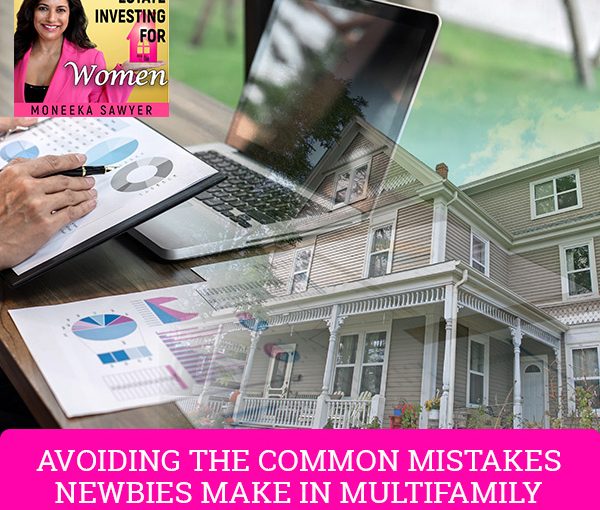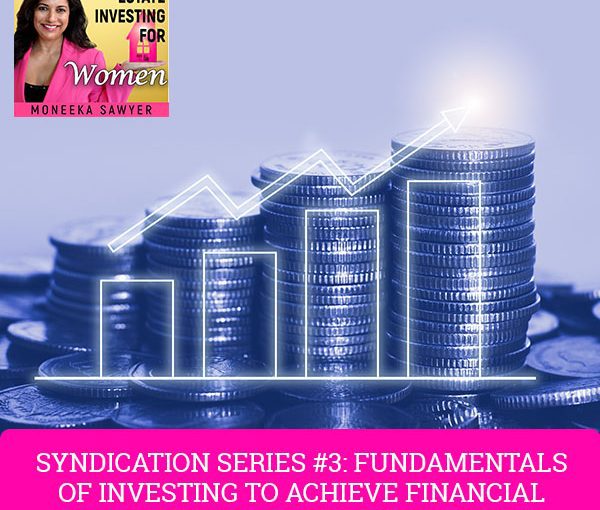Setting Up Your 2025 for Success!
Moneeka Sawyer is often described as one of the most blissful people you will ever meet. She has been investing in Real Estate for over 20 years, so has been through all the different cycles of the market. Still, she has turned $10,000 into over $5,000,000, working only 5-10 hours per MONTH with very little stress.
While building her multi-million dollar business, she has traveled to over 55 countries, dances every single day, supports causes that are important to her, and spends lots of time with her husband of over 20 years.
She is the international best-selling author of the multiple award-winning books “Choose Bliss: The Power and Practice of Joy and Contentment” and “Real Estate Investing for Women: Expert Conversations to Increase Wealth and Happiness the Blissful Way.”
Moneeka has been featured on stages including Carnegie Hall and Nasdaq, radio, podcasts such as Achieve Your Goals with Hal Elrod, and TV stations including ABC, CBS, FOX, and the CW, impacting over 150 million people.
Avoiding The Common Mistakes Newbies Make In Multifamily With Taylor Loht
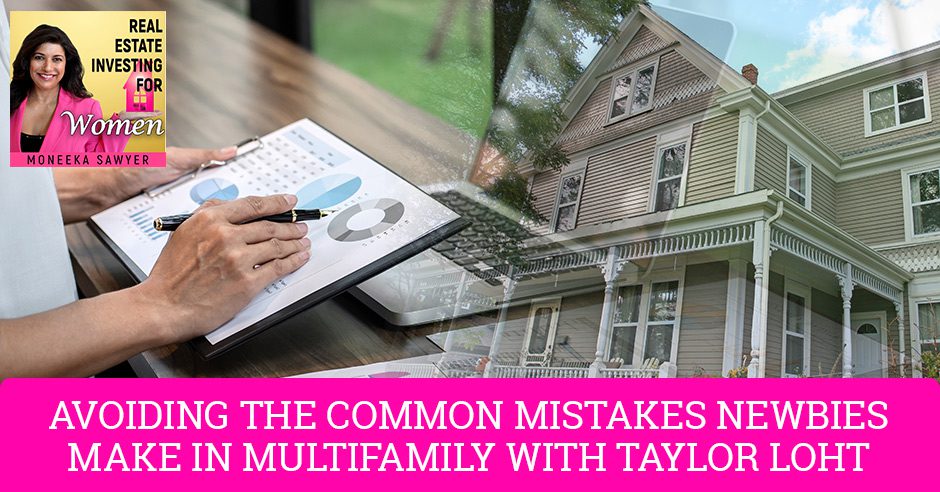
Newbies in real estate tend to make mistakes in a lot of things. Although mistakes are possible, we can still correct them. What could these mistakes be? In this episode, Moneeka Sawyer welcomes Taylor Loht, host of the Passive Wealth Strategy Show, to discuss the common mistakes in multifamily you should avoid to help you build wealth. Inaction is the most common mistake newbies commit, but when you take action and commit to the process, the result of your efforts can be fruitful. Cultivate discipline in your life and move forward as you build wealth. Want to learn more? Tune up the volume and tune in to this conversation now.
—
Watch the episode here
Listen to the podcast here
Avoiding The Common Mistakes Newbies Make In Multifamily With Taylor Loht
Real Estate Investing For Women
I am so excited to welcome to the show Taylor Loht. I had the pleasure of meeting Taylor. I was on his show. He was such a pleasure to talk to so I wanted to share him with you ladies. Taylor is a multifamily and self-storage real estate investor. He has acquired, partnered on, or had a hand in over $150 million in commercial real estate. He hosts the Passive Wealth Strategy Show, which I was on, which helps listeners escape the Wall Street casino and build wealth on Main Street by investing in real estate while avoiding the common newbie pitfalls. Taylor, it is so good to see you again. Welcome to the show.
It’s great to see you as well. Thanks for having me.
Could you give us a high-level version of what brought you to real estate? Give us your story.
I’ve done a lot of thinking about this and trying to be more self-aware of what happened and occurred. In 2015, I had been investing in Wall Street’s stuff for a while and doing pretty well because I got lucky when I started making money and we were in the market. 2015 brought new things. The price of oil fell from $110 or $120 a barrel down to $40 something over the course of that year. It took with it a lot of the stock market. We had a lot of stagnation and that got me questioning. I was like, “Maybe this isn’t the right way to build wealth in the long run.”
At that same time, I so happened to read Rich Dad Poor Dad. All those things factored in together and joined together and got me thinking there’s got to be a better way to build wealth. I started learning about real estate and hit the ground running I suppose. I was going to go get MBA and decided not to do that after reading Rich Dad Poor Dad and started investing in real estate. That’s the quick version.
Your story is so similar to mine. I got my degree, thought about getting an MBA, and decided instead to take that money and invest in real estate.
It’s tough to look at the MBA and think between the salary that I’m not earning and the cost to get the MBA. It’s going to cost me $300,000 to $400,000 to do this and then I’m going to have a big pile of debt and a job I don’t think I want to make more money. That didn’t feel right. Robert Kiyosaki showed me that my misgivings about that were right and I had to go another direction.
How long have you been investing in real estate?
I started investing in 2016 as a passive investor with the goal of getting more active in the space, scaling and growing. For me, it’s a little bit of a hockey stick type of thing. I’m a very introverted type of person naturally. You mentioned getting your first degree. My first degree is in Chemical Engineering. I’m a nerd. I didn’t spend my teens and twenties getting out there and socializing. I had friends and stuff, but I wasn’t like a big man on campus.
I had to go learn how to meet people at real estate networking events. I had to learn how to do things like what we’re doing now, doing a show, and speaking to all your awesome readers because this is not the type of thing that I naturally gravitate toward, but to get to where I wanted to go in life, I had to learn how to do these things. I had to learn how to build a level of comfort and confidence doing these things. That took time, but that’s okay as long as you’re working and moving forward then there’s nothing wrong with that.
I’m with you. What is the biggest newbie mistake real estate investors make? Where do they go wrong?
When we’re talking about people who are new, they say may start going to real estate networking events and trying to figure out what’s out there and all these kinds of things, the biggest mistake is not taking action. Parenthetically thinking that education equals action. Education is great. I’ve spent a lot of money on real estate education more than I ever thought I would, but you have to turn that education into action. This includes me at the beginning because you don’t know exactly what to do when you’re getting started, so you don’t know which direction to go. You’re getting pulled by shiny objects or can’t pick a path and stick to it.
You have to turn that education into action and commit to the process. Share on XWhen new real estate investors want to get started, they don’t know where to start. Maybe they go to a networking event, or they hear about a course that’s going great. Maybe they buy it or don’t, but either way, if they buy it, they might not stick to that. That might not hold them down the road. They might go buy the next program and then eventually give up because it doesn’t work. They might try for a month and then they don’t get a deal for a month. It took me years to get my first deal of continually working at it and growing. It’s taking action and committing to the process. Stumbling and falling on your face sometimes is part of the process. It’s something that most of us deal with at the beginning.
It is interesting because one of the real big tenets of this show is to take action. What I shared with one of my guests is to take mindful action. For me, action is about doing something. Education is an action, but you do have to go to the next step. Also, don’t get analysis paralysis. Go to that next step, commit to a strategy, and move forward towards actions toward that strategy. It’s all action, but it’s a matter of not getting stuck in any particular action either because there are other things.
For instance, if you want to do no money-down strategies, you’re looking for lease options and calling distressed sellers. Don’t get so caught up in the phone calls that you don’t close any deals. That’s also getting stuck. What happens is people buy a course and they’re like, “I’m going to learn all of these scripts by heart.” You have to make phone calls. When someone says, “Yes,” you have to follow up. Don’t like freak out and say, “I’m not going to call them back.” There are baby steps in that process. It starts with education, but then you got to keep moving forward.
Speaking of being on the phone with people, you have to get to the point where somebody yells at you and calls you a jerk because you’re trying to do this deal with them, and for whatever reason, it’s going to happen. I got over it. I’ve been yelled out of the phone by people a few times whose property I’m trying to buy, but it gives me pause. I’m a sensitive guy, but you got to make the next calls and move on to the next one and whatever those hurdles are that we have to get over.
I’m never going to poo-poo education. You have to apply it. Maybe you learn about wholesaling and you’re like, “I don’t want to be a real estate wholesaler.” I don’t want to be a real estate wholesaler either. There’s nothing wrong with being a wholesaler, but if that’s not your path, no problem. Find the path that is right for you, commit to it, and move forward.
How do you overcome the key limiting beliefs of new investors?
Do you mean on an individual level like my own limiting beliefs?
Yes.
My opinion is that’s a daily practice. That’s something that we, as individuals, have to work on. I’m realizing that 2015 was a very pivotable year for me. I had that shift in my way that I built wealth, but also, I started training in Brazilian jiujitsu and I still do at the end of 2022. I became a vegetarian in 2015 and I’m still a vegetarian. I’m marrying a vegan in 2023. I’m stuck on that path too. I’m perfectly happy with it.
In this realm, you have to constantly be challenging yourself in taking that next step. If you’d asked me in 2015 when I was brand new at jiujitsu and didn’t know anything, “Are you going to stick with it? Are you going to get to purple belt level?” which I am now, I would’ve said, “I’m not so sure,” because I had those limiting beliefs in my mind. Now, if you asked me if I’m going to keep progressing, absolutely. As long as I don’t get injured and can keep going and training, I’m going to keep pushing forward, but it’s only because I’ve continued to press through all of those various beliefs.
Now, I work with a lot of passive investors. The first couple of phone calls for example that I had with passive investors scared me, but you have to do it. There’s always the first one, whatever it is, like the first offer that you make, the first property you get under contract or the first investor who wires you money. “I have $100,000 of this guy’s money and I have to put that money ahead of my own. That’s scary,” but that first one is what gets you going and starts the fire.
If you’re familiar with this thing going around called 75 Hard and I don’t know if your readers have heard of that, but it’s put out by this guy named Andy Frisella. It’s about cultivating discipline in your own life. There are a few things that you’re required to do every day for 75 days. You’re required to follow a diet. He doesn’t tell you what one to follow. He says, “You got to pick it and stick to it.” You have to exercise twice a day. One of those exercises or workouts has to be outside. You have to drink a gallon of water a day.
There are a few other things you have to do. You have to take a cold shower every day for five minutes. I don’t like cold showers. The rest of the stuff I can handle. I still hate the cold showers. You also can’t drink if you like alcohol. I like whiskey but I’m not drinking it because I’m sticking to the program. If you miss one thing, you got to start back again on day one.
You also have to take a picture of yourself shirtless every day for 75 days. Those pictures of me are never going to see the light of day. My fiancé doesn’t see them. They’re only for me. I tried this program and I made it probably 3 or 4 days. I’m not sure exactly what I missed. Maybe it was a culture shower or something else, but I had a limiting belief when I got started about whether I could accomplish it.
I’m not at the end of the program now. The jury is out. I haven’t completed it, but I’m significantly further than I got last time. I didn’t have this same level of limiting beliefs about whether I could stick to my diet or work out twice a day and one of them outside. It’s hard to fit this stuff into your schedule. That’s a lot of time. The cold showers stink, but I can get it done and just don’t enjoy it.
It comes down to putting one foot in front of the other. If and when you “fail,” or if you don’t meet your own expectations which are most of the time because you didn’t take the right actions. We knew it at the time like you have an email to respond to from somebody or a call from a potential seller and you’re putting off calling them back. You need to take that action. Even if this deal that you’re working on doesn’t go anywhere, you need to have that process in your mind that mentality or mindset of, “I’m going to take the action on whatever this thing is,” and it comes down to cultivating that in your life as much as you can.
I love your whole attitude about possible failure. I like to call it more like trial and error rather than failure because failure feels bad. A lot of people are like, “Try is such a weak word like I’m going to try.” I don’t mean it that way. What I do mean is we set a goal and if we are not able to get to the very end of that goal to reach it, examining along the way with this beginner’s mind or gamer’s mind maybe what was it that I did wrong, was not committed to, or didn’t do right? How can I get better at this? I love the fact that you brought in something so personal because that’s where we practice. In business, we feel like the stakes are so high and they’re not higher than personal development.
For personal development, the results are significantly more impactful in your life but they don’t feel as scary necessarily as in business. I love that you’re practicing this ability to create goals, pursue those goals, reexamine where the errors happened, and pursue them again. There’s no real failure. There’s just evolution and success. I love the way that you did that.
We then can take those skills and move them into our business practices. When we’re on the phone with somebody else or taking somebody else’s money, it’s scarier, but you’ve started to develop that skillset required for having that gamer’s mind. “What is this adventure going to bring? How can I become a better person? How can I do this better?” I love the approach that you explained. We’ve never had anybody talk about this deep personal goal setting journey the way you did.
I’m glad to share what I’ve learned. I’ll be honest. I don’t mean to put myself as somebody who is super disciplined all the time. I’ll give you an example. I got injured in jiujitsu. I broke a couple of ribs or maybe severely dislocated them. I had a pretty bad rib injury. If you get a rib injury, you can’t breathe, pick stuff up, and do jiujitsu. I ended up taking a few months off of not training. When you have a rib injury, you can’t do anything. You can’t lift weights.
Eventually, I started doing some jump rope outside and trying to keep my cardio going, but it was hard. I was sitting around and can’t do my favorite thing, which is exercise in any way. My diet and mindset slipped a bit. I put on a little bit of weight. It’s only 5 or 6 pounds and I got it off now. I see life as a process of learning and continuously developing, and then seeing we’ve stumbled and trying to get ourselves back on track, not all at once, but day by day. “What are the steps that I can take to get myself back on the path where I want to be with whatever our goals in life are?”
That’s how life needs to work in order to be fulfilled and consistently learn, grow, and recognize that we’re not always going to perform to our best expectations. Things are going to come up in life, but when we can recognize that and say, “I’m not performing as well as I can. How can I get myself back on track?” That’s what it takes to grow over the long term and build wealth but grow as a person as well, which is more important.
We can mitigate risk as much as we can, but there’s always risk involved in putting yourself out there. People say that public speaking is one of most people’s most feared activities. You’re more afraid of public speaking than you are of dying. Jerry Seinfeld has a good joke about this. You’d rather be the guy in the casket than the one giving the eulogy. That’s not something that I want to do.
When I was a kid growing up and I had to speak in front of the class, I hated it. I didn’t even get any joy out of that, but to get where I want to be, I have to learn how to work through that. Truthfully, I don’t enjoy it but it’s “easier.” It’s less mentally taxing when you can focus on providing value to the audience. My method when I have to do public speaking is to practice until I’m not worried about what I’m going to say and that’s focused on providing value to the audience. The process is getting over our fears progressively. However, it applies to our real estate investing. It’s just huge. Fear is a limiting belief. I’m dealing with them.
You mentioned that you’re an introvert and that you’ve had to develop skills to have that not be negative. I am an introvert too. Nobody ever believes me when I say that, but I’m not a very outgoing person. I was at a big real estate event down in Southern California and I realized there were so many missed opportunities there because I sat with my friends whom I wanted to connect with. That, to me, is what fills me up. It’s these real conversations with people that I care about and want to get to know more. I’m not the person that’s a good networker so there were so many missed opportunities.
However, it was the thing that made it even possible for me to be there because I decided I was going to meet 2 or 3 new people and the people that I was going there with I didn’t know them well so I could build those relationships deeper. I’m all about deep relationships. I am not the best networker and I do terrible in groups. If I’m in a room of a lot of people, I completely shrivel up. Those are characteristics of an introvert and it has never held me back. I’d love to hear your perspective on that because you’re the same way. We don’t hear a lot of that in this real estate world, right?
That’s true. We don’t hear people talking about it because, in many ways, people perceive it. This is maybe changing society, but people perceive introversion as being antisocial or generally less good at business or an investor because you don’t get energy out of networking with 50 people at a networking event. I don’t particularly enjoy that myself, but if you can focus on what you are good at and sometimes you have to do things that you don’t like to do. That’s true, at least for me.
Sometimes you got to get out there, network, and deal with it in your own way or whatever makes sense for you. For myself, if I am at a real estate networking event, particularly a big conference, after talking and trying to build connections with people, I have to step away for a little while and take 5, 10, 15 minutes, or however long to get myself back centered and trying to regain some energy whatever it is. I got to check out for a few minutes. Maybe I’ll take some time to digitize some business cards or be productive with that time checked away so that I can come back to the event with the energy that I need to have. I’m not going to be there forever. These events are typically 2 days or sometimes 3 days. I can deal with it for that long.
Sometimes you got to get out there, network, and deal with it in your own way or whatever makes sense for you. Share on XMy fiancé and I have known each other for a few years before we went on our first date. We met in jiujitsu. She started not too long after I did. We knew each other at the name level. That’s how I pretty much used to know everybody at jiujitsu. I’ve changed that over time as I’ve worked this muscle of building connections with people and I’ve seen that as a valuable muscle. It’s great to get to know people. Years ago, we went on our first date. She asked me out and we connected. We learned how much we have in common and get to know each other on a deeper level.
It went from there. We’re great and very happy, but at that point, we’d probably known each other for a few years where we’d seen each other 3 or 4 times a week for years, but my natural tendency is not to strike up conversations, especially with women at the gym. That’s not who I am. Again, she asked me out. I wasn’t asking about women at the gym. That’s my natural tendency. I’m not there to meet people. I’m there to exercise and get to know this sport. Now, I see the value in the real estate world when I’m there. That’s how I’ve built a lot of connections with many of my investors.
What I’m getting at is that we can succeed in real estate too. There’s more understanding of that and growth in the culture. There are more knowledge bases and strategies out there available to learn from. There are quite a few very good guides for introverted real estate investors to build connections at real estate networking events that are out there.
I’ve had one gentleman in particular on my show in the past that trains introverts on how to succeed in networking and sales with an angle into real estate investing. His name is Matthew Pollard. I got to recommend checking out his content. I’ve got a few of his books on my phone, but suffice it to say that it can be done for those of us who are introverts. We just have to use strategies that work for us in whatever our particular real estate investing niche is. You can find a way.
One of the things about creating a blissful real estate business is to build that business based on your strengths and who you are rather than trying to fight who you are and try to be something that you’re not and build a business on that because it’s not sustainable. We do grow, but you don’t want it to be so painful that it stops you.
I say frequently on this show, there are 1 million ways to make $1 million dollars in real estate and pick one that’s aligned with your strengths, and it’s not dependent on the things that you’re weak on. If I’m weak in networking, I don’t want to build a business that’s completely dependent on networking. It doesn’t mean that I shouldn’t grow that skill, I shouldn’t network, or I shouldn’t push myself, but I don’t want my business to be completely dependent on that until I build some confidence there.
Build a different business, at least to start, and it’s possible. There are so many ways to make money in real estate being an introvert. You don’t have to be what people perceive as what real estate success looks like. I love having this conversation because many of my readers must be introverts and think, “I can’t network,” but you can. It’ll be a skill that you need to develop, but you don’t have to start your business and be completely dependent on that. Pick something else. There are many different strategies.
I totally agree. We can do it. You need to find the route that works for you, build, and learn over time.

Common Mistakes In Multifamily: You need to find the route that works for you, build, and learn over time.
Taylor, could you tell everybody how they can reach you? I know you’ve got an awesome free gift.
My show, Passive Wealth Strategy Show which you’ve been on, and thank you for coming on, is where we teach our listeners how to escape the Wall Street casino and build wealth on Main Street by investing in real estate. We have new episodes every Monday, Tuesday, and Thursday. We also have a free video course on red flags in Passive Real Estate Investing. I invest and do multifamily and self-storage syndications and actively raise money for these deals from passive investors.
I get a lot of questions from passive investors about good things to look for in a syndication. We made the video course of seven things that I’ve seen go wrong in many deals across the board. You spend enough time networking and getting to know people one-on-one in private non-recorded conversations, people will tell you so much. You ask them and let them run. They’ll tell you so much about what went wrong with their deals. When you spend several years in the business as I’ve had and hopefully many more, you start to see some trends and things that can go wrong. You can get that course at PassiveRealEstateCourse.com. It’s totally free. My company is NT Capital at NTCapitalGroup.com. You can look us up there as well.
I am intrigued by the idea of the red flags. You said that there are seven, could we do a deep dive for maybe 1 or 2 on what you’ve learned about them in EXTRA? Would that work for you?
That would be great.
We’ll do a deep dive into 1 or 2 red flags that you should be looking for when you’re looking at investing with a syndicator. I want to highlight that Taylor is a syndicator. He is looking for investors. If you like what he has to say, reach out to him regarding that also. Taylor, are you ready for our three rapid-fire questions?
Let’s go.
Give us one super tip for getting started in real estate investing.
Know your why. Why are you here? What are you committed to achieving? Not, “I want to go buy real estate. I want to go build cashflow.” Those are great and we’ll get there, but start with the deep reason you’re here. Is it that you want to create a retirement for yourself or fuel your own retirement? Is that you want to send your kids to college? Is that you want to be prepared as your parents get older and have the finances to make sure you can take care of them? Whatever it is for you or you want to travel more.
I’m not here to tell you what your goal should be, I’m here to tell you that you should know what it is because it’s going to help push you through tough times. When you get on the phone with somebody and they don’t want to talk to you telling you how much of a jerk you are, that why is going to help you make the next phone call.
What is one strategy for being successful as a real estate investor?
It comes down to every day. A lot of people talk about having morning practice in your life. It’s every day thinking about your goals. Honestly, one of the best tools that I got from a coach who I paid a lot of money to give me this tool, but this is a free thing you can find on YouTube. Go look up Earl Nightingale’s The Strangest Secret. It’s awesome. I listen to it all the time over and over again. It comes down to our lives and experiences. Our success is shaped by the thoughts in our heads.
Are we having positive thoughts? Are we having negative thoughts? If we always focus on the bad things, then we’re only going to notice the bad things and the negative. If we focus on the positive, the good things, the opportunity, and what we can go out and achieve, then we’re more likely going to go do it and achieve those things. I recommend looking that up and listening to it.

Common Mistakes In Multifamily: The thoughts in our heads shape our success. If we focus on the positive, the good things, the opportunity, and what we can go out and achieve, then we’re more likely to do it and achieve those.
What is one daily practice that you do that you would say contributes to your personal success?
For several years, I’ve done intermittent fasting every day. I’ll be honest, it’s come and gone in my life as life gets in the way sometimes. Here and there, I fall off the track, whenever something happens. I’ve been sticking with 16/8, so that’s 16 hours I don’t eat anything, but I drink coffee and water and I only eat meals 8 hours a day. I’m not here to say that’s right for anybody else, but there’s something to it that helps me focus on my goals.
I did a phase where I was eating one meal a day after I get home from jiujitsu. I hadn’t eaten anything for 22 to 23 hours. I go do an hour of jiujitsu, get home, and be so hungry, but the first meal was so good. I wouldn’t necessarily recommend that. I’m not doing that right now, but thinking about that every day helps me eat healthily. As I said, I’m a vegetarian, but there’s a lot of crappy vegetarian food out there just because I’m a vegetarian doesn’t mean I only eat vegetables. I don’t all the time, but doing that every day helps me. Plus, I’m in my 30s. I’m getting older.
I also like listening to Tony Robbins. Somebody who’s healthy has 1 million goals. Somebody who’s unhealthy, sick, or has few months left to live, they have one goal. If we can focus on keeping ourselves healthy, we can keep going after those million goals. As I said, I’m in my 30s. My grandfather who I’m told I’m the spitting resemblance of and whom never got to meet died in his 50s. I’m thinking, “If I’m following his track, that means I’m over halfway done. I got to take care of myself.” I’m sticking with it, but that’s super important. It all starts with taking care of your body.
If we can focus on keeping ourselves healthy, we can keep going after those million goals. Share on XI love that. Thank you for all that you’ve offered on this portion of the show, Taylor.
Thank you for having me.
Ladies, stay tuned. We’re going to be talking about passive investing red flags in EXTRA. If you are subscribed to EXTRA, stay tuned. If you’re not, go to RealEstateInvestingForWomenEXTRA.com and you can sign up there. For those of you that are leaving Taylor and I, thank you so much for joining us for this portion of the show. I look forward to seeing you next time and until then, remember, goals without action are dreams. Get out there, take action, and create the life your heart deeply desires. I’ll see you soon.
Important Links
- Passive Wealth Strategy Show
- Rich Dad Poor Dad
- 75 Hard
- Matthew Pollard – Past Episode of Passive Wealth Strategy Show
- PassiveRealEstateCourse.com
- NTCapitalGroup.com
- RealEstateInvestingForWomenEXTRA.com
——————————————————
To listen to the EXTRA portion of this show go to RealEstateInvestingForWomenExtra.com
Learn how to create a consistent income stream by only working 5 hours a month the Blissful Investor Way.
Grab my FREE guide at http://www.BlissfulInvestor.com
Moneeka Sawyer is often described as one of the most blissful people you will ever meet. She has been investing in Real Estate for over 20 years, so has been through all the different cycles of the market. Still, she has turned $10,000 into over $5,000,000, working only 5-10 hours per MONTH with very little stress.
While building her multi-million dollar business, she has traveled to over 55 countries, dances every single day, supports causes that are important to her, and spends lots of time with her husband of over 20 years.
She is the international best-selling author of the multiple award-winning books “Choose Bliss: The Power and Practice of Joy and Contentment” and “Real Estate Investing for Women: Expert Conversations to Increase Wealth and Happiness the Blissful Way.”
Moneeka has been featured on stages including Carnegie Hall and Nasdaq, radio, podcasts such as Achieve Your Goals with Hal Elrod, and TV stations including ABC, CBS, FOX, and the CW, impacting over 150 million people.
Why The Right Syndicator Believes In Education With Pili Yarusi – Real Estate Women

A syndicator could make or break your real estate career. Many consider them the person in charge of your success. That is why before diving deep into the game, you need to arm yourself with the right syndicator. In this episode, we welcome back to the show Pili Yarusi. Pili is a syndicator herself and is the Cofounder and Operator of Yarusi Holdings LLC. She speaks for the second time on the show with Moneeka Sawyer to share great tips on finding the right syndicator for you. Pili takes us across her journey and offers insights on the importance of education and taking mindful action. At the end of the day, this is your investing journey. You need to protect it as much as you can. Begin by choosing the right people who can help you towards success. Join Pili as she guides you how.
—
Watch the episode here
Listen to the podcast here
Why The Right Syndicator Believes In Education With Pili Yarusi – Real Estate Women
Real Estate Investing For Women
I am so excited to welcome back to our show, Pili Yarusi. I had her on the show a couple of years ago. We had an amazing conversation. You should go back, look her up, and check out that one. I’m so excited to have the next conversation and share with you all the ways that she’s grown and all the new things that she has to bring to the conversation. I’m super excited about this conversation.
Before we head into that, let me reintroduce you to Pili. Pili is a loving mom and wife whose goal is to lead with Aloha by example. Pili is a Cofounder and Operator of Yarusi Holdings LLC with her husband Jason. Yarusi Holdings is a multifamily investment firm that repositions underperforming properties through operational efficiencies, rebranding and value add renovations.
Pili and Jason have managed the successful and profitable exit of these multifamily properties. The Yarusis have an active real estate portfolio of over $100 million. She co-hosts Multifamily Live, The Jason and Pili Project, MOM – Moms of Multifamily and MORE – Moms of Real Estate. All can be found on Facebook, YouTube and anywhere you tune in to shows.
—
Pili, welcome back to the show. How are you?
I’m so good. Thank you so much for having me back on. That was so many moons ago. We were giggling about how amazing it is that we laid the foundations for the people that we become with the things that we read and the things that we do years ago.
Through COVID, you moved locations. You were active on Clubhouse. I’ve been watching all your events on social media. It has been amazing to watch you grow and then to hear in your bio all the numbers and how things are so different than they were years ago. Congratulations. You’ve done an amazing job.
Thank you so much. It was interesting to hear you read some of our old numbers when we were starting, like our triple-digit units. You said we had 100 and something units.
Ladies, we were reading over her bio first. It was the old bio from years ago. It was 426 units and 100 and something in direct management. Look at those new numbers.
We’re at $200 million in assets in direct management and over 2,000 units. We took down our first building in 2017 and here it is. It’s almost 2023. It’s been an amazing ride. It’s been so much fun.
Take us through your journey a little bit. You’re a syndicator. We have a lot of syndicators that come on this show. I’d like to hear about your journey. For me, one of the things that I want to chat about on this show is I feel like my ladies have heard a lot about syndication. We’ve highlighted some amazing syndicators like yourself. Some are amazing and some, I don’t know enough about to say.
My ladies know that the syndicator or the person in charge is the single most important indicator of success. The ladies have had a little bit of a challenge as far as making a move toward investing in these syndications. I’m not sure if you’ve dealt with that, what your experiences have been around that and what advice you can give the ladies. That’s where I wanted to head. Let’s start by reminding us of your story and telling us about the journey over the last few years.
I want to answer both questions at the same time. I’m going to start with something that you and your ladies can think about. For a syndicator, my most important job and this is per the SEC Regulations or the Securities and Exchange Commission, I need to make sure you’re educated. That’s my biggest concern. My second biggest concern is that I need to make sure that you know me and that I know you.
It doesn’t surprise me, honestly, that it’s such a big leap. Number one, you need to get educated about this new asset class. It’s something that you keep on hearing about but haven’t dove into because it takes a little bit of education to dive into correctly. We talk about passive investing all the time. A true passive investor knows what they’re getting into first and understands it.
When it comes to real estate syndication and going in with a syndicator like myself, I want you to know me. I want you to have access to me. I want you to know that I am going to take care of your investment as far and as much as I can. Those are some of the things that I want you to chew on as I’m going through my story.
I’ll save you me growing up in Hawaii and all that stuff for a later date. Maybe we can have tea one day and talk about that. My real estate journey has honestly been one of complete growth and change. We talked about this a little bit in the last episode that I had with you. I might have been pregnant with one of my children. I’ve been either pregnant without or with a small child for this entire growth period.
Jason and I got together at the end of 2012 into 2013. We decided we wanted a family. We had our first child in 2014. We also got into real estate in 2013, flipping and wholesaling homes. We started doing small rentals and had a construction company. He still had his brewery and I was a real estate agent so a lot was going on plus growing our family.
When multifamily syndication hit us, it hit Jason first. I remember him talking to me about it. I was pregnant with our second child. We still had all these businesses. We were growing. We were prospering but we had so much to juggle. I told him no. It goes back to what you were saying. You and a lot of your ladies haven’t taken the jump into real estate syndication. I said no. I was like, “We have so much going on. Why would we start another business?” We were talking about getting into the active side.
That’s key. There’s the active side and then there’s the passive side. You were looking at going into the active side.
I wasn’t educated enough to even understand that there was a passive side. I didn’t even know this at that time. I was like, “I am pregnant. We have all these things happening.” It was what I said before. It was education that got me there. We jumped in with a mentor instead of how we jumped into flipping and wholesaling, which was like, “Let’s watch HGTV. We have a construction company so we can flip a house.” That is another story for another day.
For multifamily, we got a mentor. We educated ourselves. We ended up taking down our first multifamily at the beginning of 2017. It was a 94-unit in Kentucky. Let’s flash forward a couple of years to 2013. We’re at $200 million and 2,000 units. My biggest concern is to educate. It’s not small amounts of money. It’s not $1,000 or $5,000. Most minimums start at $50,000. Some are $25,000 but most are at $50,000. That’s not something most people have in their back pockets. I want you to be comfortable. I need you to be comfortable. If you’re not comfortable jumping into the syndication, then don’t. Don’t jump into one until you feel comfortable enough.
Don't jump into a syndication until you feel comfortable enough. Share on XWe talked a little bit about real estate in general. I believe real estate is the best asset to jump into. I’m going to come back to what I said in the beginning. As far as much as you know the person that’s running it, do they have a background of success? Do they have other investors that you can talk to? Do you have their cell phone number? Can you get a hold of them if you need to? If you don’t understand them or understand something, can you get a hold of them?
It comes down to being comfortable in what you’re investing in because this is your hard-earned money. We like to talk about passive investing. You want to make money with your money but first, you’ve worked hard for that money. Let’s make sure that the people that you’re investing with are also going to work hard to make money with your money.
I’ll be honest. I have invested with a few of the different syndicators that, over time, I’ve gotten to know. They’ve been on the show a few times. You’ve sent me a few things. You know this because my answer to you was, “I am finishing up a construction project. I need to stay liquid.” This has been my story for the last couple of years and it’s very frustrating.
When you’re in construction, you do need to have quite a bit of liquidity. This is our first project in this company. We started the company together. This is my first project together with my partner. Liquidity was a hugely important deal for me and continues to be. I was talking to my partner. I probably shouldn’t say this here but we’re all friends. My partner and I were saying, “How much are we in cash?” Over 10 years, because it’s been a 10-year project from when we bought the property to when we got the permits to when we’re finishing the build, we are in for $1 million. That’s personal cash for each of us.
I’ve sold properties. I’ve had to make things happen. That’s in addition to the loan that we owe. In the end, we are going to do fine but we’re not going to make a killing. One year’s income is what we’re making on the back end of this. We missed the boat as far as when we’re selling. We didn’t get rich on this project but I learned a lot. One of the things that I learned was liquidity was key. If we had not finished it, we would’ve ended up with a lot of builders, especially during COVID. For me, there was a liquidity thing.
I will say that it’s a bit of a shield because I don’t feel yet that I’m educated well enough to make those decisions about what kind of syndications I want to go into. Some things came up so we did end up putting it into three. I’ve diversified. I’ve got 1 mobile home park, 1 multifamily and 1 storage thing that I’ve invested in. That was early on. That was before I met you. I then stopped.
I made good decisions. The people that I’m investing with are good and it is because I know them. I trusted them with my money. As I look, “What am I going to do when liquidity isn’t this big deal to me? I want to invest. Where am I going to go? How am I going to go do this?” We’ve had some people come on the show to educate us but for some reason, I’m feeling like it’s not deep enough. Talk to me a little bit about the kind of education that you share with your people to make them comfortable with taking that leap. You’re right. $50,000 and $100,000 is a lot of money.
We educate on a couple of different levels. 7 Figure Multifamily is our active program. I have some investors that have jumped into that program with the sole purpose of learning how to do it from an asset manager’s side or a capital raiser’s side. They’re learning how to do it from that side so they understand where they can put their capital and how it’s being put to use.
As an active investor, this is what I do day in and day out. This is my job. I’ve created a job. I also passively invest but this is my work. This is what I love to do. As a passive investor, you could go that deep. As you continue your journey, you can learn over time by talking to the syndicators that you talk with. We should be open books. There’s that level.
We also educate on the level of a passive investor. People and other syndicators have come on here to discuss basic syndication techniques but to honestly go deeper, it’s the phone call. It’s finding a syndicator that will talk you through the process and understand your needs and talk you through them. For instance, if one of you came to me and started talking to me about what you needed and I figured out that it wasn’t syndication, I’m going to tell you that.

Real Estate Syndicator: To honestly go deeper, find a syndicator that will talk you through the process and understand your needs and talk you through them.
If you tell me that you want a quick return on your money, I am not your lady. I don’t do quick returns on your money but I’m not going to force you or help you to understand that this is the way to go. I’ll probably introduce you to a house flipper or private money lending. That’s also good. It comes to being comfortable. You want to be comfortable. You don’t want to make a mistake. Unfortunately, it’s investing.
You’ve run through the gamut of your project. In this ten-year project, you’re not going to make a killing. A lot of it’s based on timing. Jason and I could slap ourselves. We wish we got in in 2013. We got in in 2017, a few years later. We’ve still done well. We’ve had ten successful exits. We’ve had dozens of investors who are happy with how we’ve performed. Can I promise that in the future? Historically, Jason and I have done well. I don’t have a crystal ball but we are educated and open.
Most of my investors, if not all, because I call them with my cell phone, have my cell phone number. They can call me if they need to. They can let me know what troubles they’re having or if they have a question about something that’s on their K-1 or if they have a question about what we’re doing or if they want to go deeper. They deserve to. Their $50,000 tells me that they deserve to have my cell phone number and to call me if needed.
I’m not sure how other syndicators run their businesses but that’s how we run ours. I’m not going to say you because I don’t want to talk to everyone but for me, being comfortable and educated was the key to my growth. When you started talking about the old episode we did together, you mentioned all these books that I had quoted and the things that I was studying. Those were the foundations of the woman that I am.
You mentioned the book, 12 Week Year and Miracle Morning. I haven’t read those books for a while. I should probably revisit them. Those are my foundation. Those are part of why I succeed. The reason I’m so good at what I do is because of the foundation and the education I laid down for myself. With investing in any real estate, you should educate yourself. That’s what may be holding some people back. It’s true education. It’s that comfortable I know what I’m getting into education, not I’m pressing a button on my Robinhood app and hoping for the best.
Hope is not a good investing strategy. There are a couple of things that come up for me as you were talking. I love that we can have a real conversation live. Thank you. You’re warming my heart. I love this.
Thank you.
Two things come up for me. The first one is I’m so afraid of calling you and saying, “Give me some information.” I get that information and then I’m sleeping on it and I’ve got another question. I’m one of those people that will ask you questions until you feel like you’ve been buried. I will keep asking questions. I will also say this. I have never in my entire life lost a dime in real estate. Every single deal has been successful but I will ask into the ground. Yay for me on one level but people that do business with me are like, “Another question?”
Even I’ll say it on this show. You have to take action. I’m fully aware of that. Business people who know me know have seen my portfolio and my life. They know that I’m an action taker but I will not take action until I feel safe and comfortable. If you got a phone call from me every day for ten days, wouldn’t that be frustrating for you? I know my ladies are thinking the same things.
I’m going to give you a quote from Tony Robbins. “Success leaves clues.” There’s a reason why you’re so successful. It is because you ask the right questions. The other thing I’m going to say is that’s why we have email. You don’t have to call me. You can email me all your questions. I’m going to go back to the price point. $50,000 is the minimum. I have people who invest upwards of $500,000. I have one investor that brought all the capital to one of my deals. That was upwards of $1 million. They will ask questions.
Whether or not I am nose deep in kiddo stuff and my kiddos deserve all my time too but if you have a question for me, you are the most important person. Your capital is your life. You worked hard for that. Who am I to get irritated because you want to know what a K-1 is, what this line means on that K-1 or why I am painting the wall gray instead of white? Who knows what your question is going to be?
This is not said any place in the SEC but once upon a time, I was a real estate agent. I am inbred with this idea of fiduciary duty. I have a fiduciary duty towards you even though it’s not set in stone and it’s not written anywhere. I can’t promise you profit. I can’t promise you that I’m going to be there for you every waking hour but if you have a question, let’s get it answered.
I’m going to go back to there’s a reason why you’re successful. It’s because you asked the right questions. You mentioned taking action. There is taking action but we should rephrase that into taking mindful action or educated action. It’s the uneducated action that gets us into trouble. That split-second moment of putting all your money into one pot sometimes works and people make millions of dollars.

Real Estate Syndicator: Take mindful action or educated action. It’s the uneducated action that gets us into trouble or that split-second moment of putting all your money into one pot.
There are those times and it happens more often than not that they don’t because they invested in the wrong thing or with the wrong person or at the wrong time. It’s taking mindful action and making sure you’re pressing the buttons for investments that make sense for you and the numbers make sense. I believe in investing in people, number one.
You said a couple of things that I want to go back to. I love this idea of mindful action. The action does not necessarily mean jumping in. Doing your education is also action. Reading this show is also action. Taking action towards your goals does not mean immediately jumping into something without feeling enough confidence around it to experience success.
You know this at the end of the show. I say, “Goals without action are just dreams.” It’s true but there are lots of different ways that you can take action. I love the way that you reframe that because that’s exactly what I mean. We do need to take action but it needs to be mindful action. That starting action can be education as long as you don’t get into analysis paralysis, which is a fine line.
There is a fine line there. You should know better that action does not necessarily mean taking that jump. Although so much of social media and everything that’s on there is like “Go. Do. Hustle.” It’s taking that time to analyze not only the deal. The deal needs to work and the numbers have to be beautiful but you need to know all the different ways that the deal might not work.
This is more important. Analyzing the person that you’re investing in and with is of the utmost importance. You can go analysis paralysis on this as much as you want or maybe not that much but enough. You should have a good relationship with the people that you are investing with. That’s why I love working with new investors. I want to make sure that if a new investor’s going to invest, they invest with me. I know that I can do it. I have that confidence.
You should have a good relationship with the people you are investing with. Share on XI know I’m a good fiduciary. I will make sure that you know me and my husband. If you have questions, you’re not going to feel bad. If you’re reading this and you want to jump into syndication and ask a million questions, I am not going to make you feel bad. Ask all of the questions. That is what I’m here for.
One of the things that you said that I want to also highlight a little bit is, “You’ve had success because you asked the right questions.” I didn’t ask the right questions in the beginning. That’s the other piece. I know a lot. I’ve been very blessed with this show. This show has educated me probably more than it’s educated any of you because I’m having every single conversation. I’m studying every single guest. It has been phenomenal for me. I’ve got a lot of education that way.
Over time, there’s been an evolution of, “This question matters and this one doesn’t.” I still ask goofy questions. I understand that it’s okay because you don’t get to the right questions until you start asking. Don’t ever feel, “Since I don’t know what the right questions are, I’m going to sound stupid. I don’t know.” It’s okay because you got to start somewhere. If you never start, you’re never going to reach success. That’s the truth. You have to take the first step. The first step is to start asking questions. Would you agree with me on that?
I agree. That’s why your ladies are with you. Ladies, that’s why you trust and you are with Moneeka. It’s because you know that she’ll help guide you through some of these questions. This is why you go with indicators that you trust because they’ll help guide you through this time and the questions that you have. With our first multifamily mentor, we still ask him questions because he continues to level himself up to a level that we’re reaching for. We can ask those questions that he is dealing with at that level when we get there.
When we took down our first building, we could not figure out how to do this one thing. We went to him. It was one question to him that would’ve taken us a week to figure out on our own asking different types of questions. This is why you go to those who know those things that you need to know. That’s why you listen to podcasts.
We probably created our podcast for similar reasons. I’ve learned so much from having a podcast and from other people that I’ve brought on. It’s been phenomenal. It’s listening to podcasts, talking to other women and talking to other people in the industry. Reach out to them. The reason why people go on podcasts is to have people reach out to them. To anyone who’s reading this, reach out to me. Let me know if you have any questions. I will answer any of them to the best of my abilities.
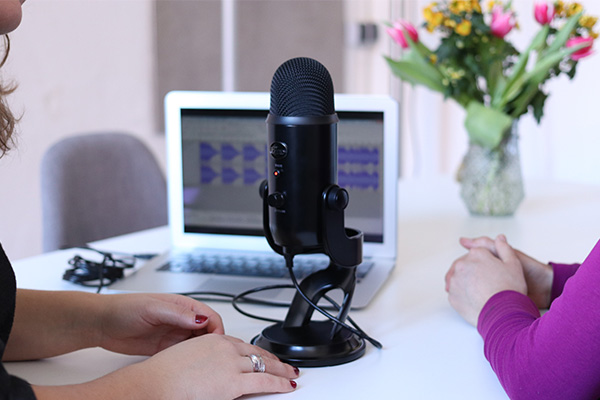
Real Estate Syndicator: The reason why people go on podcasts is to have people reach out to them.
What a great reminder. People don’t come to my show because they like having conversations with me.
I do.
There are a lot of people with whom we become friends because of this show. We’re like, “That was a great conversation,” and we stay in touch, like us. Some people do come back because they want to talk to me and I want to talk to them. The reality is that the reason that people come on these shows is that they want you to reach out to them. You’re not imposing by emailing them, calling them or telling them you’re interested. Even if you decide at that moment that it’s not the right time to invest with them, they are happy for the opportunity to have the conversation. I had a conversation with another friend of mine, Maureen McCann. Do you know Maureen?
I know of her.
She’s a turnkey person. She’s been on this show about five times. We did a whole session because she talks about 52% returns and some cool stuff.
That’s how we got into multifamily. It was turnkey. That is a whole other story.
At one point, I was calling her and was like, “Are you seeing results? Are my ladies calling you?” I trust her so much. I was like, “I want my ladies to connect with her because she would educate them.” She’s a lot like you in that way. She’s education first. She said, “Don’t be so concerned with what I’m getting out of this show. The reality is as I build these relationships, it may be ten years down the line when someone finally thinks, “I’m ready for that.” I loved that Maureen supported me in this way. Maybe I’ll connect with her again.
You don’t have to invest right away. Don’t feel any pressure that if you’re calling somebody that it’s like, “I feel committed, obligated and all of that stuff.” They would hope that if you connect with them that you would consider them when you’re investing but it’s not an obligatory thing. You get to ask questions. They’re in the business and on this show because they want to connect with you. That means emails and phone calls. All of those things are good. They’re not just okay. They’re good. You are not imposing yourself on them by making those connections.
If this is on video, I’m bouncing on my seat. I’m so excited because what your friend Maureen said is so true. I want to have a conversation with you not just for the now. If it’s for the now, then that is great but I’m talking future. The shortest time we’ve had an investment was 18 months to 7 years. Our investments are long-term investments and so are my relationships. I want them to be long-term. Since our investments are so long-term, I want to have a relationship with you. I need to because we’re going to be in this for the long run.
You are going to be a passive investor but it doesn’t stop there. You don’t get the mailbox money or you do but I expect you as one of my passive investors to read my emails. I want you to know what’s happening. I want you to be educated on what’s happening within the market. I want you to know all the things that I know and everything that I’m sharing with you.
If you go onto my website, you’re going to get my information on how to invest. We call it Becoming Independently Wealthy With Apartment Buildings. It is a very long title. I might shorten it. That’s going to be some emails that you’re going to get and some more education coming from myself and my husband. The great thing is you’re going to be invited to go into my investor portal. You have no obligation to do so but that’s more information. You get to see what an investor portal looks like. You’ll get to schedule a 50-minute call with me.
This is usually what scares people the most and why they don’t call. It is because you think when I pick up the phone, I’m going to be like, “Give me your money.” If I even talk about money, it’s probably going to be because you mentioned it first. I don’t want to know about money. I don’t even want to know how much money you make. I want to know you because I don’t know what’s going to happen for you and with you tomorrow, 5 years from now or 10 years from now when something good happens or if you have something great financially happen to you or you get into a new job and grow.
I’m working with someone who has $10,000 in savings sitting there. He’s growing his wealth. I’m working with him and helping him to grow that financial stability. I help him create a budget and create a system or a foundation. I give him books to read to grow from. I still want to know him 10 or 20 years from now when he’s invested in syndications and invested in other investments to create legacy wealth. I want to have these legacy relationships. It’s not a one-time phone call. This is me wanting to get to know you. I will never ever talk money unless you want to.
I have one other question and I’ve never asked a syndicator this. Let’s talk a little bit about exits. When you’re in syndications, some of the things that happen is they have this plan. They’re going to do a value add, a new build or whatever it is. They give you all the numbers of what this is going to work out and then what are they going to rent it at.
If they’re doing a value add, they’re having to cycle people out as leases come up. There’s a whole process. They’ll say, “When the project is done, we’ll refinance it. We’ll pay off your thing. You make a certain amount of money. Either you’ll make income on the rents over the long-term or if or when we sell it, then you make that capital.” There are lots of different ways that you earn money, which is how they come up with their final IRR, Internal Rate Revenue.
These are the exit strategies or the possible exit strategies that we hear a lot about. What if things go bad? Let’s talk a little bit about how that works. One of the things that I want to preface this with is one of the things that I know. If you’re with a good syndicator with a good project in a good location, as long as you can get the time to be right, the project will recover even through a bad time or a slump. You have to be okay with, “The timeline on this project is 2 to 7 years.”
Maybe they said 2 years, 3 years or 5 years. You got to understand that their biggest obligation to you is to make money for you. If that means that it’s going to take a little bit longer than the 2 years, 5 years or whatever it is, then sometimes, they need to do that to hold it long enough so that they don’t see a loss.
You’re still going to make money on the rent but it may not be the payoff as fast as you would want. That’s the one thing that I have always had in the back of my mind when I go into syndication. This is what we’re shooting for. It’s not the best case. It’s also not the worst case. It’s to allow for the time to be right. I’d like you to talk about the way that you look at exits and what happens if things go bad.
It all starts with underwriting. You already said it too. It’s best case, worst case and base case. The numbers that we put out to our investors are usually very much the base case. We normally don’t even put out the best-case scenario because we never want to overpromise. There are ways that we can make more money on the property. There are ways that we know how to advance the property further than how we put it out there. We normally don’t put it all out there because a lot of the time, when we exit a property, we still want to leave meat on the bone for the next owner. We can take it to those places.
What happens when a property goes sour? This hasn’t happened to us yet. It goes back to underwriting. You have to make sure that the numbers are solid. There are a lot of things that we can’t control but we want to control them as much as possible. You said our number one goal is to make money for our investors. That is true but there are numbers 1.2 and 1.3.
Our other goal is to make the best place possible for our tenants to live. I know that has nothing to do with your question but we are education first and tenant first. If we have happy tenants in a good community, then our investors thrive too. If our tenants are thriving, our investors are thriving. Number three is communication. A syndicator needs to communicate with you when things are going bad and good so that when things are starting to go south, it’s not a surprise. This is why multifamily is such a great investment. It’s a span of 2, 5 or 7.
If we have happy tenants in a good community, then our investors thrive, too. If our tenants are thriving, our investors are thriving. Share on XI used to tell people we stop at 7 but we do underwrite for 10 years. This is why multifamily is such a great asset. It is because it’s supposed to stand the test of time. Maybe rents go down. Maybe we have a fire. Maybe something happens that is out of our control. That’s key. When something like that happens, that’s why we’re given this time to figure it out and bring it back up. We figure out how to rectify the situation and bring it back out but it’s those things that we can’t control.
It is the things that we can control that you want to make sure that the syndicator has a handle on. They can control the numbers that they enter into their property. That’s why we underwrite and keep on underwriting. That’s why we do worst case, best case and base case because we want to make sure that we are not surprised by the numbers.
If the worst-case situation should happen, we want to already know ahead of it. If we get the best case, that’s great. We already know ahead of it. We want to make sure we have a handle on all of these things. It’s your property management team. We do not actively property manage the asset. We manage the property managers. We are the asset managers. We look over everything and make sure everything works.
You want to make sure that you know who the asset manager is on the syndication. Don’t just invest or talk to the syndicator. The asset manager is your key person on the deal. You want to make sure you have his number if something goes wrong. You want to make sure that you know that he or she is doing the right thing. That is the person that is the puppeteer for the entire deal.
Once you go through acquisitions, you have people that come in. Maybe they’re part of the asset management team or acquisitions. Maybe they helped underwrite. Maybe they did due diligence on the deal. These are various ways you can get into a deal and they brought capital to a deal. Whoever is the asset manager, once the acquisition happens and the sale happens, that person or that team takes it over. That is the person or team that is making you money.
Is that you with your projects?
That’s me and my husband. My husband is the key asset manager in our team.
You are the asset manager as well as the syndicator. Is that true?
Yes. Syndication 101 is the pooling of investors’ funds. I am a syndicator because that is what I’m doing within the asset. That is how I’m funding the asset. It’s with the syndication. The asset manager is part of the syndication. He or she isn’t even part of the syndication. She’s part of the business plan. When you take over a multifamily building, you’re creating a business. It’s business within itself.
The main manager is the asset manager. That is your key person. That is the person you want to talk to. This is the person that you want to make sure you know, like and trust with your $50,000, $500,000 or whatever it is because this is the person that’s going to be managing those funds and all the other managers.

Real Estate Syndicator: The asset manager is your key person. That is the person you want to talk to. This is the person that you want to make sure you know, like, and trust with your funds.
I hadn’t heard that distinction before so thank you.
You’re welcome. There are two ways I could take this conversation. One of the reasons why you might not hear that term before is that a lot of syndicators out there don’t do the asset management part. They raise the funds. They’re part of the business plan but they don’t have the decision-making. You want to make sure that you know the prime decision-makers in the deal.
When a deal goes sour and I’ve heard of a few, all I can say is the things that go wrong are usually because they didn’t have their numbers right in the beginning and they weren’t communicating with everyone. There’s that saying, “Do and ask forgiveness later.” It’s the opposite with syndication. You want to make sure that the people that you are working with because limited partners are still partners. They know what’s happening with their money and what’s happening with the asset in good times and in bad.
I haven’t heard of anything that’s fallen apart but those that I have heard that have gone slightly more toward the sour end could be solved with communication and making sure that you have your numbers right from the beginning. That’s why each building that we’ve gone into has had its business plan. We follow that business plan and pivot when needed. That’s why we’ve had ten successful exits. It is because we have a foundation of education of people first that the numbers have to work. That’s always the caveat. We invest in people but the numbers have to work. We run the numbers religiously. We keep on running the numbers inside of the deal because markets fluctuate.
Pandemics happen.
Craziness happens. The thing is multifamily has pulled through the entire time. Will it go down? Will it go up? I don’t have a crystal ball. That’s why education is necessary so that if you are investing your $50,000 into, let’s say, syndication, you know that that money has the possibility of making money but also has the possibility of not. One of our biggest concerns is the return on capital. We want to make sure that we make money on your money but we want to also make sure we return that capital. You don’t want to lose money. That should be the number one rule in syndication school.
You don't want to lose money. That should be the number one rule in syndication school. Share on XOne of the things you said also highlights the value I have when looking at a syndicator. Do they have mentors themselves? Your syndicator has the experience and work ethic. They’ve got all their resources. One of those things that are going to ensure success is that they’ve got people that they can go to when they have a question because they’re at their level. Maybe they’ve been in it for 5 years, 10 years or 20 years. Other syndicators have been in there longer. There are always new adventures that happen in real estate. Hopefully, it’s not too many adventures. You don’t like adventures in real estate but they happen.
They do happen even though you don’t want them to.
That’s right. We don’t want adventurous investing. It’s good to have people that you can go to. You’re going to the syndicator and the syndicator should have someone to go to that has been through the cycles that can then mentor them if they hit bumps in the road.
We have our mentors. We also have a group. Within 7 Figure Multifamily, this came out of a group that I was originally with, 7 Figure Flipping. Those were my mentors in the flipping and wholesaling industry. When Jason and I broke off and did multifamily, I kept in contact with those mentors. Every so often, I would let them know about a deal that I had. I would let them know, “We should partner up.” Jason and I had already created our mentorship program at that time but I saw this way to uplift everyone.
The great thing is having this amazing relationship not only with my mentors in multifamily but I get to also watch and be a part of this family within 7 Figures and get to ask them questions. They’re other investors who either have gone through the things that I’m going through or are going through it. I can talk with them and learn from them.
It’s also learning from your peers, not only from those that have come before you but from those who are going through it. They might have answers to the questions that you don’t know even to ask. That’s what good mentorship provides for you. It provides someone to go to whom you can ask them any question and they will answer with no ifs and buts because they’re there for you. They’re there to mentor you and help guide you as you step up into your future.
As always, we could talk forever but I want to be respectful of your time. Before we end this show, could you tell everybody how they can reach you? Ladies, take notes.
The best place to get to go to is my website, www.YarusiHoldings.com. It’s easy. When you open up the email, there’s going to be a button you can click to get more educated. You can click on the button and learn more about me and my team.
She’s also got that free report there for you. You can download that to get a little bit more education. This conversation has, as always with you, been so yummy. Thank you.
This has been amazing. It was great to catch up. I cannot wait to have you on my podcast. We will extend this conversation into more of what you’re doing.
That sounds awesome. Thank you so much. Ladies, thank you so much for joining Pili and me for this show. Wasn’t it awesome? I love it when you get to overhear a couple of girls chatting. It’s so important to me that you feel comfortable and blissful in making your choices. That’s what this show is all about. I feel like Pili modeled that in so many ways. Thank you for joining the two of us. Until then, remember, goals without action are just dreams, so get out there, take mindful action, and create the life that your heart most deeply desires. I’ll talk to you soon. Bye.
Important Links
- Yarusi Holdings LLC
- Multifamily Live
- The Jason and Pili Project – Instagram
- Last Episode – Create a Strong Foundation with Pilialoha “Pili” Yarusi
- 7 Figure Multifamily
- 12 Week Year
- Miracle Morning
About Pili Yarusi
 Pili Yarusi loves to help people and “Lead with Aloha”.
Pili Yarusi loves to help people and “Lead with Aloha”.
She is a founder and Investor Education and Relations Director for Yarusi Holdings, a multifamily investment firm that has acquired over 2000 units valued at $180 Million since 2016. The firm repositions properties through operational efficiencies, moderate to extensive renovations, and complete rebranding.
Pili is a co-founder and coach at 7 Figure Multifamily – focusing on Real Estate Syndication and Multifamily Investing and trains others on the success formula for buying apartment buildings at www.7FigureMultifamily.com.
Pili is a co-host of The Multifamily Live Podcast providing actionable content and tools to build and strengthen your multifamily business.
She is also the co-host of The Jason and Pili Guide to Real Estate Investing – a fun and interactive YouTube channel that features all the great things that she and Jason are working on.
She and her husband Jason have three awesome children, Luke, Lily, and Leo, and an English Bulldog, Jill.
——————————————————
To listen to the EXTRA portion of this show go to RealEstateInvestingForWomenExtra.com
Learn how to create a consistent income stream by only working 5 hours a month the Blissful Investor Way.
Grab my FREE guide at http://www.BlissfulInvestor.com
Moneeka Sawyer is often described as one of the most blissful people you will ever meet. She has been investing in Real Estate for over 20 years, so has been through all the different cycles of the market. Still, she has turned $10,000 into over $5,000,000, working only 5-10 hours per MONTH with very little stress.
While building her multi-million dollar business, she has traveled to over 55 countries, dances every single day, supports causes that are important to her, and spends lots of time with her husband of over 20 years.
She is the international best-selling author of the multiple award-winning books “Choose Bliss: The Power and Practice of Joy and Contentment” and “Real Estate Investing for Women: Expert Conversations to Increase Wealth and Happiness the Blissful Way.”
Moneeka has been featured on stages including Carnegie Hall and Nasdaq, radio, podcasts such as Achieve Your Goals with Hal Elrod, and TV stations including ABC, CBS, FOX, and the CW, impacting over 150 million people.
Syndication Series #5: Scaling A Multifamily Portfolio With Liz Faircloth
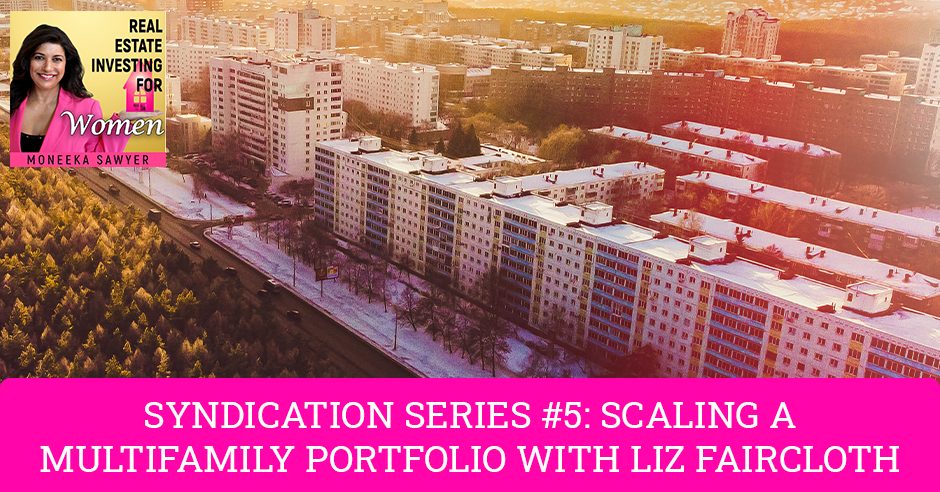
Multifamily is the ultimate goal of many real estate investors in America. Achieving the dream is possible, but how about scaling? That’s where Moneeka will help as she discusses scaling multifamily investments with the cofounder of the DeRosa Group and the Real Estate InvestHER community, Liz Faircloth. Liz talks about getting into real estate, how she and her husband pivoted into multifamily, and what you need to know about out of state investing. Learn more from Liz and Moneeka about the multifamily market by tuning in.
—
Watch the episode here
Listen to the podcast here
Syndication Series #5: Scaling A Multifamily Portfolio With Liz Faircloth
Real Estate Investing for Women
In this episode, I am so excited to welcome to the show, Liz Faircloth. She Cofounded the DeRosa Group in 2005 with her husband, Matt. The DeRosa Group, based in Trenton, New Jersey, is an owner of commercial and residential property with a mission to transform lives through real estate. DeRosa has vast experience in bringing properties to their highest and best value, which includes repositioning single-family homes, multifamily, apartment buildings, mixed-use, retail and office space.
The company controls close to 1,000 units of residential and commercial assets throughout the East Coast. Liz is the Cofounder of The Real Estate InvestHER community, a platform to empower women to live a financially free and balanced life through over 25 Meetups across the US and Canada, an online community and membership that offers accountability and mentorship for women to take their businesses to the next level.
She is the co-host of The Real Estate InvestHER Show, which I will be on too. They published their first book, The Only Woman in the Room: Knowledge and Inspiration From 20 Women Real Estate Investors. Liz has been interviewed for many articles and top-rated podcasts, including mine, including being a two-time guest on the top-rated BiggerPockets Podcast and the Best Ever Show. On the personal side, Liz is an avid runner, has completed several triathlons and marathons, has two adorable children and is a New York Mets fan. Liz, welcome to the show.
Thank you so much for having me.
It’s nice to see you again. You and Andresa do so much cool stuff with the investor community. I love what you’re doing together, but I haven’t gotten to chat with you about what you’re doing. Why don’t you give us a high-level version of your story of how you got interested in real estate and what your path has been?
It wasn’t a linear path. My husband and I at the time had started dating. Before we started dating, I was in graduate school for Social Work. I got my Master’s in Social Work, wanted to open my practice and help people. That’s always been my passion. I grew up in a great family but middle-class family. My dad was a school teacher. I was never introduced to entrepreneurs or investors. That wasn’t in my sphere of any context growing up. Hard work ethic was there, but certainly the business piece of it, I was not familiar with or didn’t have a lot of exposure.
Until I met my brother-in-law, who was an entrepreneur, started a business and handed me Rich Dad Poor Dad. I’m 23 at the time. He’s like, “You got to read this.” I liked personal growth books. I started in college reading different books and always enjoyed them. I liked learning and growing. I’m a dork in college. I’m reading Awaken the Giant Within and everyone’s like, “What are you reading?” I’m like, “I don’t like fiction.” I still don’t like fiction. I have to learn something from it.
Long story short, I read that. My eyes were open to this idea of passive income. I honestly never heard of that before like, “I can have money working for me, not me working for money.” It was a whole new opened my eye concept, which I know a lot of people have said, but what got us involved, I then started dating my now-husband. We lived about two hours from each other. Every weekend we’d go to all the REIA meetings and start learning.
Make sure you’re mitigating risk for yourselves, but most importantly, your investors.
We’re in our twenties and didn’t know anything. We didn’t have any money to invest, but we said, “Let’s just give this a go.” We start taking courses. They told you to like the door knock. This was before Facebook Marketplace. It was literally opening the newspaper, go to the foreign ads and calling tired landlords. That was the million-dollar tip we got at one of the events. That’s what we did.
Every weekend, literally, we are knocking on doors, right outside of Philadelphia, where my husband lived when I visited him. One day, we got someone to say, “That’s interesting. Let me think about that.” We called them back and struck up a deal. A year into us taking courses, door knocking, cold calling and bootstrap whatever we could do, we struck up a deal and bought our first property. It was a duplex for $150,000. We learned everything on that property. We’d go with people.
When you buy a property, the tenants that are there may not be your tenants ongoing because of a new sheriff’s in town. We learned the whole multifamily. It opened our eyes. It was only multis in this neighborhood. It wasn’t like we chose a duplex. It just happened because it was older homes right outside of Philadelphia. There were only duplexes and small multis. Long story short, we got our start there, we moved to New Jersey and started our business. We focused on New Jersey in buying properties there.
We sold that property and did a 1031 into a four-unit and then that started our trajectory in New Jersey. Over many years I’ve been doing this, we had lots of twists and turns. I wished we focused on multi, but we didn’t. We got involved in a lot of different things early on, like people who get distracted as they do and people that are probably a little naive, little young as well, can do. We flipped houses.
We got into tax liens. We bought a commercial building. We bought raw land. Every random thing you could possibly think of, we probably have done it until we doubled down on multifamily. Our business is focused on multifamily. We went from a 2-duplex to a 10-unit. We grew very steadily. We didn’t go from a 2- to a 200-unit. We did, but over time and now we focus on larger multis and we’re starting a fund where we’re investing with other operators and things of that sort.
We’re diversifying a little bit outside of multi but more from a fund perspective. I’m involved in that, not day-to-day but more from like strategic level, helping build our team out and exciting to be able to invest in different sectors of real estate, not just multifamily, but we love multifamily. We have a letter of intent on a property in the Southeast, which is where we focused on.
Tell me a little bit more about this fund. Let’s dive a little deeper into that.
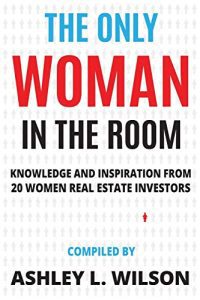
The Only Woman in the Room: Knowledge and Inspiration from 20 Women Real Estate Investors
With regards to the fund, we talk to people all the time. People are like, “This sounds like a great opportunity for a passive investor.” You’re like, “I don’t have a building. I don’t have anything under contract right now.” We refer them. We know a lot of people we like and respect in the business. We have no problem with that. There’s a lot of good syndicators out there.
We wanted to have another flavor of ice cream if you will. The fund will obviously be an ongoing rolling fund and it will give investors what we’re going to invest in and all things that we know and that we’ve vetted. We’re not going to start investing in a business that we have no idea about because that’s a whole other level. It’s like mitigating risk. We want to mitigate your risks. You want to make sure you’re mitigating risk for yourselves, but most importantly, your investors.
Hard money loans will be one. We’re going to start to work with hard money operators that we like and respect, that we know to do good business. We were not the hard money lenders. They are and we’re going to do that. Multifamily will be a piece of it. If we have a project that comes up, we’re going to almost invest in our own projects. That will be a piece of it. Those are the two main pieces.
I want to say, even self-storage, there have been operators. That might be another sector. It will be all related to investing in real estate on some level, but it will be in a way that we are not the sole operators of everything. That’s where, as we evolve, it’s like, you don’t want to do everything yourself. Once you figure that out, you got to focus on that. That’s what that looks like. We’re building out a team and that’s been in the making for some time, but that’s the goal.
I’m so fascinated by that idea because I feel like for me too, there’s something that I do well. I do executive homes in Silicon Valley. I’ve got my entire system. It’s all built out. It runs itself. I don’t worry too much about it. I was telling you before that I’m taking all of May off for my birth month because that’s where my birthday is. We’re traveling to Hawaii and going to a spa in Palm Springs with my sister.
I get to have that lifestyle. It is fantastic. I’m not particularly interested in working significantly more. I do get bored because we have construction projects. We have some other stuff going on so that my entrepreneurial mind doesn’t slow down or get bored. What is happening is I’ve found several different syndicators doing different things. I’ve invested in storage, multifamily and a variety of different things like what you were talking about.
I don’t know how this is going to work for you guys, but every single time I invest, it’s a minimum of $100,000. That’s great for us because we have that money. We’re looking to retire. We’re moving that way, but not everybody who’s reading to this show has access to $100,000 for this and that. They want to be able to diversify without spending that much money. What is that fund look like for you? Is there going to be a minimum investment? Have you worked that out? What does that look like?
One organization we’ve started working with is called Republic. Basically, what they do is, in essence, have a similar type of approach in that people could invest $10,000, even down to $1,000. Don’t quote me on that but I’m not familiar. What’s fascinating though if that for our last syndication, it was a 336-unit apartment building. To your point, our minimum was $50,000 on that project. Not everyone has that, but they want to invest in real estate.
Don’t do everything yourself. Do what you do and do it well.
We found this company and what basically they’re doing is they’re the investor in that project, but they’re the ones going out to the accredited investors because it was the accredited investors to then say, “We are all pooling all this money to gather,” then they are the investor in that project with us. Just so Jane Doe, who’s got a $1,000, they’re all pooled in this together in this company called Republic. Republic is ultimately the investor, if that makes sense. It was really cool because that was the first time we’d ever done that because we thought about it. We have a 336-unit apartment complex. We had close to 80 investors. It’s a lot of people and that’s even at a minimum of $50,000.
You had some people who put a $500,000 and some people put any amount. There’s a lot of money assigned. I’m the cheapest person. I would be putting $1,000 at anything. I’m like, “That’s me. I’m in that kind of money.” I know. I get it. That was interesting. We were pleased to see that. It’s a neat approach. That’s the future, to be honest, because I love that concept and I was intrigued by it. As we do other deals, we’re going to be working with them. I’m not sure the relationship exactly and how that’s going to play out in the fund, but those are the neat example for our last syndication that gave everyone the opportunity and that’s cool.
Are they more of crowd funders, syndicators or do you have any idea of their structure? I’m interested.
I’m not too sure which level they are. I heard about it conceptually and was intrigued, but I know that they’ve been around and they’re not just at the start of the company. There are a lot of different pieces around it to ensure how you do it because some funds are accredited and not accredited. There is an of legal stuff and a lot of money to the SEC attorneys and all that kind of stuff.
I know this is a project we advertised because we only accepted accredited. It’s a project that you can’t solicit. It’s illegal to do that. We have these other projects from friends and family, but I know with this particular project, we advertise because we only accepted accredited. It’s a neat approach, but I’m happy to get more info.
Let’s put our heads together. I’d love to know a little bit more about that because I’m always looking for ways. When I get phone calls from my ladies, when they say, “I’ve only got this much, what can we do to that, for that and with that to benefit them in the biggest way?” Another topic that I’m getting a lot for my ladies is this idea of out-of-state investing, especially here in California. There are a lot of markets where people feel like, “I can’t invest in my backyard.” They’re scared to go out of state. I know that you do a lot of multifamily out of state. Let’s talk a little bit about that, share your perspective and how to look for projects and stuff like that.
For our first seven years, we invested locally. We don’t invest more than 30 minutes away. We had a team. We had a leasing agent. We had our bookkeeper who did all the accounting. We have a tenant relations person and a maintenance person. We had literally four people on our staff besides my husband and me, helping us manage our local properties. We bought a property in Philadelphia, which was an 18-unit and now it was 35 units. It’s like, “We can still do it.” The market shifted. I’m in the Northeast and New Jersey is not the most favorable state on taxes in this country. Even in Philadelphia, the projects that we were looking at were getting outbid.

Scaling Multifamily: We’re not going to start investing in a business that we have no idea, because that’s a whole another level.
It was getting more expensive and we raised money. We work with investors. The returns are important to ensure that we’re going to get into the right project. We’re not just parking millions of dollars from a relative. we’re constantly looking at, “How are we going to get into the right area for our investment goals and our investors?” A broker had brought the same broker. That’s the first thing I’d say as a good tip is to start building relationships with commercial brokers.
Sometimes it’s tough, especially now. You think about a hot market. Everyone’s calling commercial brokers saying, “I invest in multifamily. Do you have anything for me? You and 90 million other people.” You got to like differentiate. Keep that in mind too. We had closed that eighteen-unit with the same broker who called us about a property in Lancaster, Pennsylvania, which is about an hour and a half from where we were living at the time.
He said, “Are you interested?” We like, “One hour and a half, we’re not going to send our leasing agent there. We’re not sending our maintenance person there. We need to look into property management companies.” After betting the deal and that’s a great story in and of itself. The first domino always is a good property management company. You’re going to need that. Some people successfully invest in properties and they self-manage the properties. I’ve heard of it. I know a lot of women who do it successfully.
We knew at a 49-unit, it wasn’t going to be our best strategy. We knew it was going to be important to have a local property management company. Why I say that’s a great person to have on your team? Let’s say your sourcing an area in Alabama or wherever you’re sourcing deals. Before even looking for property, start getting to know the property management companies there because that’s going to follow.
If you cannot find a property management company in a geographical area, that might be a sign for a lot of reasons that something is off. Even with Airbnb, I know that’s very hot vacation rentals and luxury vacation rentals or whatever the people are interested in. If it’s a hot area, there are people managing in that hot area. That’s a great source and a great team member to start to talk to. Number one, they know the area, what streets are good or aren’t good? What areas are up and coming? What areas are just too hot and too expensive because we know that’s the case.
In it exuberant, everywhere is like, “Hold on. What do you want?” On my way to Target, at the end of the day, you’re a real estate investor. You never turn it off. I saw a lot for sale. I’m tangent. I saw a sign that said For Sale and a handwritten phone number. I’m like, “That’s a good sign.” It’s a great area and what county where I live. I’m like, “That’s an interesting area.” I texted the person. I said, “How much is the lot? What’s the size?” All the things you ask. “We’ve done a bit of new construction a time, but we could probably pull it off $250,000.” I’m like, “I don’t even know if you’d get $500,000 for the property. That’s just for the lot.”
People are not even with their prices. Going back to out of state, property management companies are helpful to have on your team. What commercial brokers care about is if you’ve closed deals. They do not want to work with people who are going to get to the finish line and not be able to pull the money together because they want their commission. That’s what they care about.
Beyond everything else you want to talk about with them, they care about if you’ve closed with them or with anyone of them. If you or someone on your core team has closed deals that you’re looking for. If you’re looking at 100-unit, you better have someone that you’re bringing to the table that, “This is the kind of team we have and we’ve done. This is what we’ve closed.”
The idea of the diversity of jobs is even more important than job growth.
That is what they’re thinking right now when you call them. This broker brought us this project and we started to talk to property management companies in the area. What helped and I’d always say this, is if you have somebody in your family or network who lives in the area, it is helpful. You don’t need to have a degree in real estate. They don’t have to have ten years of investing.
If you have some boots on the ground and feet on the street, people that aren’t just property management because our property management company is a vendor, we always like to offer our property management companies potential ownership in the building. Every time we buy a building and we say, “We’re syndicating this. Would you like to own part of it as well?”
It’s not the best sign if they’re like, “No.” Even if they put $25,000 and maybe they think that’s chump change. Most of all the property management companies we’ve worked with have invested in our deals. That’s a good sign. That’s skin in the game, so to speak. I would say the second, start to look at, “Is this an up-and-coming area? Do I know anyone in my network that can help me? Is there a reason to go there? Do I want to go there?” If you’re going to invest in an area that those are questions to ask. If I have to now get on a plane, is that on the way to my aunt or my parents? Is this an area where my kid’s going to college for the next four years?
I don’t know, but make it make sense versus an area that literally you know no one. That can work, but if you can blend a few things in there and it is an up-and-coming area, you’re going to want somebody that’s 10 to 15 minutes from the property, whether it’s a realtor, you got to pay them hourly. If you can’t get there, someone needs to get there because fires happen. Things happen. We have a cousin in this area, Lancaster.
When we’re looking at it, we’re like, “What do you think?” He’s an investor, which was even better, but he was able to be our boots on the ground. He’s part of our general partner. It has been huge. We had a fire there years ago. We want to be to make sure everyone’s okay. We couldn’t be in one hour and a half. The fire is probably going to throw a little more damage than ten minutes.
You said so much there, but a couple of things that I want to highlight is I think that people think that you hear about an amazing market and you should just invest in there. I remember before 2008, in the mid-2000s, everybody was in Henderson, Nevada, outside Las Vegas. I have close friends who are all invested. There was also Florida and Chicago.
Those were some big hubs where they were marketing to investors from out of state, especially California, because California had a bunch of equity and wasn’t working for us. Everybody could get loans by just stating things, so there were these pockets that were trending. People were making money hand over fist.

Scaling Multifamily: You’re going to need a good property management company if you’re investing out of state.
I thought I always play the longer trend. I don’t play the short short-term trends. I will admit I would probably be a lot richer if I got that right more often, but there are so many people that get that wrong. Part of it is they didn’t do some of the things that you talk about. It wasn’t a place that I would ever want to visit. It wasn’t a place on the way to anything Las Vegas, Chicago or Florida. A lot of people didn’t have that mentality of, “Would I want to go there? Would I vacation there? Would I want to live there? Would I want my kids to go to college there? Is there any reason for me to go there?”
Even in Henderson, it’s not like people were like, “I’d like to have something in Henderson because I like to go to Las Vegas.” It was, “I’m investing in Henderson because everybody else is investing in Henderson.” I love how you talk about this, especially in your first few deals. This is hugely important is as you’re getting to know what this is like, the very first time you step out of state, you don’t want it to be in a market that you completely don’t understand that you get a bunch of numbers from someone that’s a vendor. They’re interested in selling these properties.
They’re not going to lie to you, but they’re definitely going to paint a very pretty picture. If you don’t know the market and you don’t know anybody who’s there. We had a friend that moved to Henderson and we went to visit them one time when we went on a trip to Las Vegas. He was like, “There are all these crazy investors coming in here.” All around town, people are like, “This bubble’s going to blow,” because there weren’t as many people in the restaurants anymore and there were things that were closing down.
We’re like, “How is it possible that all his expansion is happening, but the Asheville economy is shrinking?” There’s no way to have known that if we hadn’t had this conversation with our friends that had just moved there. There’s all this hype about Henderson, but they just closed down the local, Whole Foods or whatever market it was. I love what you talk about as we don’t have to have boots on the ground all the time, every time. Eventually, you do develop a skill and get to know markets or you focus on certain markets.
Especially in those first few deals that you’re going out. That is all such good advice. Make sure that it’s someplace you would want to go. It’s like basic, intuitive, common sense stuff that we don’t think about because we get whisked away in the excitement of what’s possible. That basic comments and stuff, I like to go there. Is there anything there that I appreciate? Do I have someone that’s relatively close by maybe within a half-hour that they’re not going to be boots on the ground? Just have the conversation once in a while, see how things are going in that market or whatever.
Thank you so much for that because normally, people are like, “You need to look at the colleges, employers or the average income rate.” You do need to do all those things, but it’s not the end of the story. Especially when you’re starting, it’s not necessarily going to give you the comfort that you need to get out there and do it because nothing happens for you until you take action. If it’s just the numbers and that’s not inspiring you to take action, then nothing is happening for you.
Many people do get caught up. There are so many important numbers as you analyze markets and deals, but even just the idea of what COVID brought is the importance of diversity of jobs. Are there different jobs that people can be employed by? They’re literally all in on the tech, government or in whatever industry. The idea of the diversity of jobs is, to me, even more important than job growth.
They’re both important, but just to know that people can get different jobs. These are positive things. There are many markets that don’t have that. Even high-priced areas don’t have that. We probably invest more in the workforce housing, more up-and-coming areas, not areas that are on any hot market list. If those are the two expensive areas, we’re like, “No. We don’t want to invest in an area that’s on any list.”
Your mistakes are going to just make you propel you forward and you’re going to learn from it and you’re going to grow from it.
It’s much more practical advice. My ladies learn a lot of good advice here from very smart people because sometimes we got to ground it. This is how you make yourself comfortable with that. Ask yourself some real common sense questions because so much of building a real business is common sense. There’s a lot of fancy languaging. There’s a lot of people that say things that sound smart, but in the end, it’s a common-sense business. Thank you so much for grounding that for us. That was helpful.
Ladies, we are going to do EXTRA. Liz and I are going to be talking more about building your team. Finding partners, building teams, when you’re in-state or out of state. She likes to say, “Who’s on the bus,” and then team-building with all those people that are on the bus. I love that picture because you’re all going out on a field trip and you’re all on this bus. Where are you going to go? How are you going to get there? Is it going to be fun? Is it going to be profitable? That to look forward to. Before we move to our three rapid-fire questions, could you tell everybody how they can get in touch with you?
In terms of some of the active multifamily projects or funds or to learn more about some of the day-to-day real estate projects, you can go over to my DeRosaGroup.com. My husband got a lot of teaching as well. We’re both love teaching and helping. You’ll see a lot of YouTube content and things of that sort from him. In terms of women who are interested in getting more support from women and getting connected, check us out, TheRealEstateInvestHer.com. From there, you can learn all about our meetups that are across the country and our Facebook Community, membership and things we got going on with helping women.
Are you ready for three Rapid-fire questions?
Yes, definitely.
What’s one super tip on getting started investing in real estate?
Don’t get distracted. Focus on a niche and go all-in on one thing.
What’s one strategy to be successful as a real estate investor?

Scaling Multifamily: Everyone gets stopped after they lose money and something bad happens, but don’t give up.
Don’t give up. I hope you don’t lose money, but you may lose money, like many of us. You’re going to see it potentially. In many years, I can tell you a lot of interesting stories. It had money like the mini Bernie Madoff situation where literally hundreds of thousands of dollars were stolen from us. We don’t give up. That makes anyone that’s successful in any line of business or anything in life, don’t give up. Know that your mistakes are going to make you propel you forward. You’re going to learn and grow from it. If you don’t have that attitude, then everyone gets stopped after they lose money and something bad happens. Don’t give up. That’s the key.
What would you say is one daily practice that you do that contributes to your personal success?
It’s something I’ve always done, then go back and forth and don’t do it consistently. I do daily prayer. I read a little spiritual and think about it. I’ve been doing like ten-minute meditation. I’d like to increase that eventually. For me, it’s been super helpful. I focus on whatever I learned in that prayer. I focus on that in my meditation. If I miss a day, it’s rare, but I have maybe missed 1 or 2 days for four months. Every day, I get that in.
My meditation practice has gently worked its way into my life, to where I don’t even think about it. It started just to happen, then I missed three days. My husband and I were on edge. I lost my temper at a restaurant. I didn’t yell at anybody, but I didn’t have the patience to wait. Nobody saw it, but I felt it. I’m like, “What is going on with me? Who is this person?” My husband was like, “Are you stressed out?” I was like, “I haven’t been meditating. I haven’t been taking Moneeka time.” I have been taking Moneeka time. I got a pedicure. I still do, but that piece that starts my day has been so important. I’m glad you mentioned that.
It’s constant. It’s like going to the gym. You can’t do it once and you’re good.
I always say about bliss, like all of our bliss practices. You can’t just brush your teeth once in your lifetime and hope your teeth are going to be good. You got to brush it every day. You got to keep doing those little things. Liz, as always, I’ve loved our conversation. Thank you for everything you shared in the show.
Thank you so much for having me. This is amazing. I hope I was helpful and gave some content that your audience will help them with.
Liz and I have more to talk about. We’re going to be talking about building teams, who are on the bus, and all of that good stuff. Stay tuned for EXTRA. If you’re not subscribed, go to RealEstateInvestingForWomenEXTRA.com. You get the first seven days for free. Check it out, see if you love it, and if you don’t, that’s totally fine. For those of you that are leaving Liz and I, thank you so much for joining us for this portion of the show. I look forward to seeing you next time. Until then, remember, goals without action are just dreams. Get out there, take action and create the life your heart deeply desires. I’ll see you soon. Bye.
Important Links
- DeRosa Group
- The Real Estate InvestHER
- The Real Estate InvestHER Show
- The Only Woman in the Room: Knowledge and Inspiration From 20 Women Real Estate Investors
- BiggerPockets Podcast
- Best Ever Show
- Rich Dad Poor Dad
- Awaken the Giant Within
- Facebook Community – The Real Estate Investher
- RealEstateInvestingForWomenEXTRA.com
About Liz Faircloth
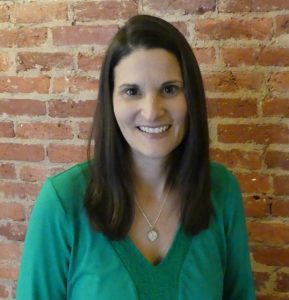 Liz Faircloth co-founded the DeRosa Group in 2005 with her husband, Matt. The DeRosa Group, based in Trenton, NJ, is an owner of commercial and residential property with a mission to “transform lives through real estate.” Liz is the co-founder of The Real Estate InvestHER® community, a platform to empower women to live a financially free and balanced life on their own terms through over 40 Meetups across the US and Canada and an on-line community and membership that offers accountability and mentorship for women to take their business to the next level!
Liz Faircloth co-founded the DeRosa Group in 2005 with her husband, Matt. The DeRosa Group, based in Trenton, NJ, is an owner of commercial and residential property with a mission to “transform lives through real estate.” Liz is the co-founder of The Real Estate InvestHER® community, a platform to empower women to live a financially free and balanced life on their own terms through over 40 Meetups across the US and Canada and an on-line community and membership that offers accountability and mentorship for women to take their business to the next level!
Love the show? Subscribe, rate, review, and share!
______________________________________
To listen to the EXTRA portion of this show go to RealEstateInvestingForWomenExtra.com
To see this program in video:
Search on Roku for Real Estate Investing 4 Women or go to this link: https://blissfulinvestor.com/biroku
On YouTube go to Real Estate Investing for Women
Moneeka Sawyer is often described as one of the most blissful people you will ever meet. She has been investing in Real Estate for over 20 years, so has been through all the different cycles of the market. Still, she has turned $10,000 into over $5,000,000, working only 5-10 hours per MONTH with very little stress.
While building her multi-million dollar business, she has traveled to over 55 countries, dances every single day, supports causes that are important to her, and spends lots of time with her husband of over 20 years.
She is the international best-selling author of the multiple award-winning books “Choose Bliss: The Power and Practice of Joy and Contentment” and “Real Estate Investing for Women: Expert Conversations to Increase Wealth and Happiness the Blissful Way.”
Moneeka has been featured on stages including Carnegie Hall and Nasdaq, radio, podcasts such as Achieve Your Goals with Hal Elrod, and TV stations including ABC, CBS, FOX, and the CW, impacting over 150 million people.
Syndication Series #3: Fundamentals Of Investing To Achieve Financial Independence With Chris Larsen
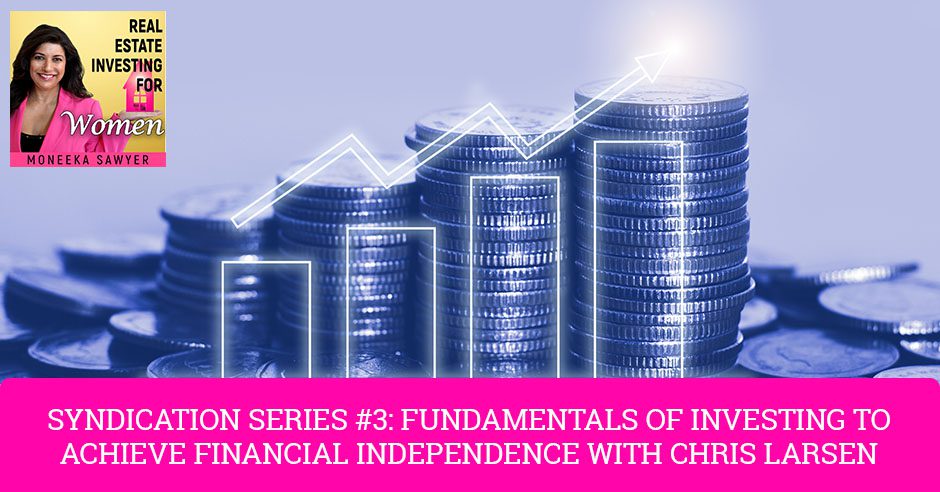
Real estate is the best path towards achieving financial independence. Becoming financially independent means having the choice to do what you want with your time. In this episode, Moneeka Sawyer sits down for some great insights into real estate with investor, author and entrepreneur, Chris Larsen of Next Level Income. We hear Chris narrate what got him into real estate, starting from single family to commercial real estate. Chris also shares his investing strategy and how Infinite Banking works, and how to leverage your insurance policy for cashflow. Drop by and listen in as Chris and Moneeka share valuable information for investors to use.
—
Watch the episode here
Listen to the podcast here
Syndication Series #3: Fundamentals Of Investing To Achieve Financial Independence With Chris Larsen
Real Estate Investing For Women
In this episode, I am so excited to welcome to the show, Chris Larsen. He is the Founder and Managing Partner of Next-Level Income. Chris has been investing and managing real estate for several years. While still a college student, he bought his first rental property at the age of 21. I love people that get into this industry young.
From there, he expanded into development, private lending, buying distressed debt, as well as commercial offices and ultimately syndicating multifamily properties. He began syndicating deals in 2016 and has been actively involved in over $225 million of real estate acquisitions. He is passionate about helping investors become financially independent. Chris, welcome to the show.
Thank you so much for having me. I’m excited to be here.
I’ve been looking forward to this show and you’ve been so patient with me with all the rescheduling. Thank you. I’m glad we’re finally here. Chris, give us a high level of your story. I know it’s very exciting.
First off, I love that you bring up to get started early. Now it’s early, whenever you can do it. I was 21 when I was in college. My passion at the time was racing bicycles. I went to Virginia Tech for Biomechanical Engineering. I did pretty well in school and I was told like, “You should be an engineer like your grandfather.” All I want to do is race bicycles.
Cycling is like a real engineer sport because it’s all about numbers and power to weight ratios. At that time, drug which I wasn’t into. That was the end of my story in a lot of ways because I didn’t want to do that. Along the way, at that same time, when I was at this turning point, trying to decide what to do as I was looking towards a professional career, my best friend, roommate and training partner passed away. He had a massive brain hemorrhage between my freshmen and sophomore year in college.
I poured another year into the sport and then I realized even after I was winning more and more races, that I wasn’t happy. Even though my team went professional, I didn’t. I stepped away from the sport, went back to school. As a junior in college, I thought like, “What the heck am I going to do with my life? I don’t want to be an engineer. I was going to go race and then figure out what I wanted to do.” While I was racing and even when I was young, the first thing I remember and probably if you’re reading, you think the same thing. You hop on your bike and you have this tremendous sense of freedom. That’s what I wanted.
I wanted the freedom to live life on my own terms to respect not only the life I was giving them but also the life of the friend that I lost. I turned towards investing. I was introduced to it by the same gentleman, Clint Provenza, who introduced me to cycling. My father passed away at five and he was a real mentor to me. I started looking into investing. I was day trading, and one of those nights/mornings that 3:00 AM, when I was laying there in bed, thinking about what I should do with my trades. I thought like, “Do I want to be doing this twenty years from now?” The answer was no.
I looked at other investments. I read over 250 books on money, investing and settled on real estate because you could control it. I bought my first property at 21. I built and managed a portfolio of single-family rentals for fifteen years but ultimately transitioned into commercial real estate. That’s what we focus on. I try to enlighten people and share my mistakes, so they can take the fast track to get towards financial independence, which took me a couple of years.
It’s so interesting. I have a very similar story in that. I wanted to be a dancer and that was my thing. I came to investing for a similar reason. I wanted a life of choice. I think that freedom of choice is our true wealth. That’s what I wanted and real estate allowed that. It did take me several years before I could say I could retire, my husband and I, but I couldn’t do with the lifestyle that I wanted in California. We would have had to move, so we continued to grow our portfolio, but it was the same thing. After several years, we are doing everything now that we’re doing because of the choice and we want to do that. There’s nothing more liberating than that.
At some point, income is important, but it’s the freedom to choose that brings happiness.
I think studies show. I teach a financial literacy course here. It’s high school students coming out of underprivileged homes. Most of them are living below the poverty line. We had a conversation about, at some point, income is important, but it’s the freedom to choose. I cited the study that shows the janitors that have freedom in their day-to-day choices are happier than the CEOs that are making 10,000 times now what they are, but they’re not happy because they don’t have freedom.
My TED Talk is about this and there’s a lot of research about there’s a threshold where money does buy happiness to a certain threshold. The original number they came up with within 2010 was $75,000, but a study was done in January 2021 that said it was $100,000. It’s gone up because of inflation. Whatever that number is, it’s $100,000 now.
Up until then, the number of dollars that you bring into your household does relate directly to the level of happiness in the household or the level of satisfaction. After that, now we have freedom and excess income. We are taken care of and now we can focus on joy, bliss. I’m so glad we’re on the same wavelength around that. Tell me about this concept of infinite banking.
Next-Level Income was born of this desire to curate information around financial literacy and education. As I built it out, we have three main areas. We talk about how to make, keep and grow your money. Those are the three steps. I have coaching clients and that’s what we work through like, “How can you maximize how much money you’re making? How can you keep more money?”

Financial Independence: Freedom of choice is our true wealth. Real estate allows that.
Thank you so much. Talk to me about your perspective on multifamily. This is a hot topic with my ladies.
I call multifamily real estate the holy grail of investing. If you look at my book, it says How to Make, Keep, and Grow Your Money Using the ‘Holy Grail of Real Estate’ to Achieve Financial Independence. I’ll send you a copy for free if you go to the website. I’m so high on multifamily. I was the person that managed my portfolio for fifteen years.
I was the person that got the phone call on my honeymoon in Costa Rica and paid $40 and collect call fees to deal with a problem tenant. I was the guy that stayed in too long and didn’t get a great return on my properties. I was also the guy that was fortunate enough to run into somebody that introduced me to this space. I started to investigate multifamily real estate and I’m a demographics guy. I spent eighteen years in the medical device industry. That’s how I made the money to invest. I got into a medical device.
I moved and lived in Asheville, North Carolina, because we have great demographic trends. When I started to investigate multifamily being an engineer, day-to-day guy and analytical, I found that multifamily was supported by these terrific demographics by what we now call the Millennials. They rented and guess who’s supporting multifamily now? It’s their parents, the Baby Boomers. They’re selling their homes and renting and now Gen Z is renting as well. We’ve turned into this nation that we like to own the American dream, but also flexibility.
I jumped into multifamily because of the demographics and the analytics. My MBA is in Portfolio Managementhat I found is something that Ray Dalio calls The Holy Grail of Investing, which allows you to increase the Sharpe ratio. The Sharpe ratio increases the returns of your portfolio and decreases the risk. It’s like a boat that goes faster and it has less bumps when you’re on it. I thought, “What is better than that?” Ray Dalio calls that The Holy Grail of Investing. I call multifamily the Holy Grail of Real Estate because it allows you to increase the returns in your portfolio and allows you to decrease the risk.
I know that in EXTRA, we’re going to talk a lot more about multifamily. We’re going to go deeper to the pros and cons of multifamily and then he’s going to do some number breakdowns for us. These are things that I get asked about a lot. It’s not my strong suit. My husband and I have not been involved yet in multifamily. The commercial evaluation of the numbers is not his strong suit, so he hasn’t had to do it yet. This will be fun. EXTRA will be talking a lot about that stuff, but why don’t you give us a high level on why you like multifamily? What’s so exciting about it?
There are a few things. If you’re reading and you’re like, “I love real estate, but I don’t want to be the person that has to go in and fix toilets, find new tenants, screen people and do showings and all that.” I get that because I’ve done it. The big thing is if you invest in multifamily with an experienced operator, it’s 100% passive. You can invest, be a direct owner, get the income, the depreciation and the depreciation of great tax benefits, especially if you’re a high-income earner, but you don’t have to deal with it all yourself. That’s fantastic. It’s scalable.
You could buy a 100 unit multifamily building for $10 million. You could buy a $1 billion multifamily portfolio. Whether you’re investing in your first deal or you’ve been investing for twenty years and you’re looking to place $1 million or $10 million of capital, you can use the same strategy. It’s very scalable. There’s something that I like even more, it’s the control. You might’ve heard me talk about laying in bed at 3:00 AM feeling like things were out of control with my money. I like real estate because you can control it.
We’re acquiring a property in Greenville, South Carolina and we live in Asheville, which is about an hour away. We were down in South Carolina for my son’s 9/11 lacrosse game. I took him to the property and we drove around. It was built in 1997. It’s a little beat up. The stairs needed to be replaced. They need new paint. We can control all of those things. If you own a business, apartments are valued like a business. They’re valued by net operating income. If you live in your home or you have a rental home and it’s 1,000 square feet, and it sells for $300 a square foot, it’s worth $300,000. It’s easy math.

Financial Independence: Next Level Income was born of this desire to curate information around financial literacy and education.
The bank figures that out because they say, “The home on your right is worth $305 a square foot, on your left is worth $295 a square foot.” Yours is about $300 a square foot. You don’t control that. The market goes up and down. If we go and buy an apartment building for $10 million and it has $1 million of net operating income, that’s probably not a great metric. Call it a $20 million apartment building with $1 million in net operating income.
We increase the net operating income 50% from $1 million with a $20 million to $1.5 million new valuation. You’re probably thinking to yourself when your cap rate is $30 million. We control that when we’re able to move the rents by the renovations, operations, being more efficient, bringing better management and those sorts of things. Again, it’s passive and scalable, but most importantly, it’s controllable.
I’m sure some of you are like me going, “Wow,” but we will break this down so you can go through this again and we’ll break down more of that in EXTRA so we can take it a little bit slower. I feel like you already covered this. What are the important metrics? What exactly should we be looking at?
I’ll dive a little deeper again. We can unpack this a lot more in the EXTRA section. I started as an investor in these deals. I was called a limited partner before I syndicated these deals and became a general partner. If you’re a limited partner and you say, “I’m interested in this.” You need to look at three different things. You need to look at geography. Are you investing in an area of the country that people want to move to? I wrote a whole blog post about this. I talked about how you can identify these. It’s very easy to see with reports from companies like United Van Lines. You can go on our blog at the beginning of 2021 and read the post I put on there.
You want to be in large cities where people are moving, that is growing faster than the national average. Where are these cities? A lot of these are from the Southeast. I moved to North Carolina for the demographics, the Carolinas, Florida, Georgia, Texas, Phoenix, Colorado and Boise, Idaho seems to be a big one here. Why are people moving here? They’re moving out of California to places like Colorado, Texas and Idaho.
They’re moving to the Southeast from places like California, LA, New England and New York. The places that are cold and don’t have a great quality of life. Taxes are going up. I have a coaching client. He told me and he’s like, “We’re looking at South Carolina to move. Taxes are going up. We don’t want to live here anymore.” Number two, the operator. Are you working with an operator? This is somebody that’s going, finding and buying the property. That’s going to bring you in alongside them and then they’re going to operate it. They’re going to increase that net operating income.
Have they done it before? Have you done it in the geography that you’re invested in? What is their experience there? You want to ask him some tough questions about what’s their strategy. You look at the metrics in the deal. That’s pretty complex. We looked at over two dozen different metrics on the deals that we’re in, and there are a lot of different variables that come into play. Again, if you’ve ever invested in a business, if you’re a business owner or professional, you can read a financial statement.
That’s the thing. If you call me and say, “I’m interested in this deal.” As an owner of this property, you’re entitled to all the same information that you would be entitled to if you own a single-family home. You can go through those and you can call the operator and say, “Walk me through this. What am I seeing here and there?” Don’t be afraid to ask those questions and understand the numbers, strategy and why an operator is going into the market.
Talk to me a little bit about ROI. Different operators do this differently. Tell us a little bit about how you structure your deals for your investors.
What we do is called syndication. Syndication is very simple, it is someone, an operator going out and bringing in investors alongside them to invest. What’s important is how that syndication is structured. What we do is we do what’s called a preferred return. If you look at deals, say 6% to 8%, what does that mean? That means investors get the first 6%to 8% of the returns coming from that property. Investors are preferred in front of anybody else. They’re going to be subordinate to the lender.
The other thing that’s nice about these properties is it’s called non-recourse debt. I work with a lot of doctors after spending several years in the medical device profession. They don’t want more risk, more debt and a bank to come after them for something. They have patients that are out for them if something bad happens. That’s a nice thing about these properties as well.
After taxes, the next biggest expense that a lot of people don’t think about is financing.
After the lender, the investors get that preferred return. There’s an equity split. That split is a large part that goes to investors and then the partners that organize these deals get the minority position in there, but that’s the incentive. You want to work with the group, in my opinion. How we do it is we give the investors the first big portion of the returns, about a half of the returns upfront. The other half comes from that split on the backside and then we as partners get a piece of that split.
We’re incentivized to maximize the profit of that property on the backend. You asked a question there and I’ll address this. There are a couple of different ways to look at this. You can look at a total return. You’re going to get a 10% return comprised of half cash and half appreciation on a property. There’s also an equity multiple. You’re going to double your money over a certain period of time, it’s another way to look at it. There’s also what’s called the IRR, the Internal Rate of Return.
We can dive deeper into the EXTRA portion of the show or you can go ahead and check out my book, which goes deeper into this as well. You can always read on a site like Investopedia, which dives deeper too. It depends on what type of investor you are. Maybe cash or the total return is important to you. It all depends on what type of investor you are.
Do you pay investors immediately? When they first invest money, are they guaranteed a certain return each year while the project is happening? How do you structure that for your people?
One little red flag is we never say guaranteed because these are investments that have a risk associated with them. If you ever hear me say guaranteed, you should either slap me on the face with a stick and a paper towel or something in my mouth too. We have a couple of different types of investments. We have investments that we pay investors a fixed return based upon the performance of the property. Our group pays out monthly. We like to pay out monthly. There are groups that payout quarterly. It’s not necessarily better or worse, but personally, I like to get money in my account every month.
You then get some stuff on the backend depending on how the project goes.
In multifamily syndication, you’re going to get regular cashflow monthly, quarterly or annually. When the property sells, think about it like a rental property. You’re getting rent. If you’re renting it out for $1,000 a month and your expenses are $900, you might get $100 a month. When you sell it, if you bought a property for $100,000 and you sell it for $150,000, you get that $50,000 profit on the backend. It’s very similar to that.
Do you guys do the whole refinance structure piece too or do you go for the sale?
When we model out the returns on a property which is called the pro forma, we don’t assume we’re going to refinance the property. If you’ve ever owned a rental property or you have a property of your own, what’s nice is if you have a HELOC, a Home Equity Line Of Credit and you pull money out of your home or an investment property, you don’t pay taxes on that when you pull that money out.
You might pay taxes when you sell it, but you don’t pay taxes when you pull it out. It’s very similar to what we do. A lot of times, we look to do that if the property is performing. We don’t tell investors that’s part of the plan because we want to be a little bit more conservative than that but that is a very optimal way to pull an investor capital out in a tax-efficient manner.
While we dove pretty deep into all of that stuff and I know we’re going to get even deeper, so definitely stay tuned for EXTRA. We’ll be talking more about the fundamentals of multifamily investing and the numbers around that and also the why or why not to do it.
Before we move into our three rapid fire questions, I want to let you ladies know how you can get in touch with Chris because he’s amazing, isn’t he? He’s got two awesome offers for you today. First of all, he’s going to give you his book for free and he and I are holding a webinar together so that you can meet him live and ask as many questions as you’d like.
Learn how you can invest like the rich to create true freedom for yourself by getting a free copy of his book nextlevelincome.com/bliss, where he’ll send you a copy of his book for free.
Also join Chris and me for a free webinar designed just for you to get informed and ask questions about how Chris does syndication and how he can help you to save the date. December 2nd, at 4:00 PM Pacific time. Go to blissfulinvestor.com/syndicationwebinar. That’s blissfulinvestor.com/syndicationwebinar.

Financial Independence: Syndication is very simple. It’s an operator going out and bringing in investors alongside them to invest.
I didn’t tell you this, Chris, but we have three rapid-fire questions. Are you ready?
I love it. I’m ready. I told you I’m wide open here, so let’s do it.
Tell us one super tip on getting started investing in real estate.
The best tip I can think of is to find somebody that has gone down the path you want to go down and either ask them for advice or hire them to help be a mentor.
What would you say is a strategy to be successful in real estate investing?
I think success, in general, is habits. Whether you want to be successful in real estate, successful in life, losing weight or whatever it may be, you need to focus on your daily habits. If you want to be successful in real estate, that may be in as far as syndications or passive investments or reviewing a deal every day or every week. If you are going out and buying your own properties, that may be contacting brokers, making phone calls and getting options out there that are coming in towards you on a regular basis.
What would you say is one daily practice that you do that contributes to your personal success?
I’ve learned a lot over the past years. I bought my older son The Five Minute Journal for Kids. It is basically a gratitude practice. I know you’re big on this. I think happiness comes before success. You have to get in that right mindset, the abundance mindset, which is what you share. You know that success and that money will come to you and there’s always a deal out there. You don’t have to worry and fight over these things. Share, help other people and other people will help you get in the right mindset. That’s what I try to do every day.
This has been an amazing show. Thank you so much for all you’ve already contributed, Chris. This has been great.
It’s my pleasure. Thank you so much for having me.
Before we close out the show, I want to head off any confusion we might have about upcoming webinars. So in order to make this series the most valuable possible for you, I have arranged to have two webinars during the next couple of weeks.
The first one is going to be with Dr. Sam, who you heard from a couple of weeks ago. He is an investor just like you ladies. And he has figured out how to evaluate syndication opportunities that come across because he gets a lot of them. And if you’re interested in them and you put your name out there, you will start to get a lot of them. You’ll learn how he evaluates them so he can figure out which projects are the best for him regarding his risk tolerance, his capital availability, and what kinds of projects he’s actually interested in, like location and that sort of thing.
Dr. Sam has developed a tool he’s now sharing. So we’re going to do a webinar with him and you can talk to him about what it’s like to be an investor in syndications and what to expect. And then also he’s going to go through his tool specifically and show you how he’s evaluating different projects. So I’m really excited about this because you actually get to have a conversation LIVE with another investor who’s actually doing investing in syndication projects. So in order to sign up for that webinar, go to blissfulinvestor.com/Samwebinar. So that’s for Dr. Sam, right? So blissfulinvestor.com/Samwebinar. And that webinar is going to be held this week on Thursday, November 18th at 5:00 PM Pacific time. So again, that’s Thursday, November 18 at 5pm pacific time. Go to blissfulinvestor.com/Samwebinar.
The second webinar we’re doing for the syndication series is with Chris, who we just heard from in this episode. As you know, he’s an operator. So he’s going to be able to answer questions about how syndications actually work, how they’re put together and all the details of what you can expect from an operator. So that’s really exciting because you can ask as many questions as you want from an actual operator LIVE. So that’ll give you more confidence what you need to know with regards to how syndications are run. So I’m super excited about this one too. And this one is on Thursday, December 2nd, at 4:00 PM Pacific time. So that’s Thursday, December 2nd at 4:00 PM Pacific time. And to sign up for this one, go to blissfulinvestor.com/syndicationwebinar. So that’s blissfulinvestor.com/syndicationwebinar.
So to give you a really quick recap, Dr. Sam, who is an investor and is going to be sharing his evaluation tool, we’ll be holding a webinar this week on Thursday, November 18th at 5:00 PM Pacific time . Go to blissfulinvestor.com/Samwebinar.
And then Chris Larson will be holding a webinar as an operator on Thursday, December 2nd, at 4:00 PM Pacific time, just go to blissfulinvestor.com/syndicationwebinar.
I think you’re going to love both webinars because you’ll get two completely different perspectives. So don’t miss them sign up now.
Stay tuned for EXTRA. We’re going to be talking more about the fundamentals of multifamily. If you are not subscribed but would like to be, please go to RealEstateInvestingForWomenEXTRA.com. You get the first seven days for free. Check it out, download as much as you can and you can stay if it’s for you. Thank you so much for joining us for this portion of the show. We appreciate you. I look forward to seeing you and until then remember, goals without action are just dreams. Get out there, take action and create the life your heart deeply desires.
Important Links
- blissfulinvestor.com/Samwebinar
- blissfulinvestor.com/syndicationwebinar
- Becoming Your Own Banker
- Next-Level Income
- TED Talk – Who is the Boss of You?
- Ray Dalio
- Where Should You Move? 5 Ways To Take Advantage Of “Geographic Arbitrage.”
- United Van Lines
- The Five Minute Journal for Kids
- RealEstateInvestingForWomenEXTRA.com
About Chris Larsen
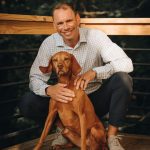 Christopher Larsen is the founder and Managing Partner of Next-Level Income. Since “retiring” after 18 years in the medical device industry he dedicates his time to helping others become financially independent through education and investment opportunities. Chris has been investing in and managing real estate for over 20 years. While completing his degree in Biomechanical Engineering and M.B.A. in Finance at Virginia Tech, he bought his first single-family rental at age 21. Chris expanded into development, private-lending, buying distressed debt as well as commercial office, and ultimately syndicating multifamily properties. He began syndicating deals in 2016 and has been actively involved in over $400M of real estate acquisitions. In addition to real estate, Chris has invested in equities, oil & gas, and small business lending, as well as being active in Venture South, one of the nation’s Top 10 Angel Investing groups. Chris lives with his wife and two boys (and Viszla, Lucy!) in Asheville, NC where he loves spending time with them in the outdoors and enjoying the food and culture that the region has to offer.
Christopher Larsen is the founder and Managing Partner of Next-Level Income. Since “retiring” after 18 years in the medical device industry he dedicates his time to helping others become financially independent through education and investment opportunities. Chris has been investing in and managing real estate for over 20 years. While completing his degree in Biomechanical Engineering and M.B.A. in Finance at Virginia Tech, he bought his first single-family rental at age 21. Chris expanded into development, private-lending, buying distressed debt as well as commercial office, and ultimately syndicating multifamily properties. He began syndicating deals in 2016 and has been actively involved in over $400M of real estate acquisitions. In addition to real estate, Chris has invested in equities, oil & gas, and small business lending, as well as being active in Venture South, one of the nation’s Top 10 Angel Investing groups. Chris lives with his wife and two boys (and Viszla, Lucy!) in Asheville, NC where he loves spending time with them in the outdoors and enjoying the food and culture that the region has to offer.
Love the show? Subscribe, rate, review, and share!
______________________________________
To listen to the EXTRA portion of this show go to RealEstateInvestingForWomenExtra.com
To see this program in video:
Search on Roku for Real Estate Investing 4 Women or go to this link: https://blissfulinvestor.com/biroku
On YouTube go to Real Estate Investing for Women
Moneeka Sawyer is often described as one of the most blissful people you will ever meet. She has been investing in Real Estate for over 20 years, so has been through all the different cycles of the market. Still, she has turned $10,000 into over $5,000,000, working only 5-10 hours per MONTH with very little stress.
While building her multi-million dollar business, she has traveled to over 55 countries, dances every single day, supports causes that are important to her, and spends lots of time with her husband of over 20 years.
She is the international best-selling author of the multiple award-winning books “Choose Bliss: The Power and Practice of Joy and Contentment” and “Real Estate Investing for Women: Expert Conversations to Increase Wealth and Happiness the Blissful Way.”
Moneeka has been featured on stages including Carnegie Hall and Nasdaq, radio, podcasts such as Achieve Your Goals with Hal Elrod, and TV stations including ABC, CBS, FOX, and the CW, impacting over 150 million people.






